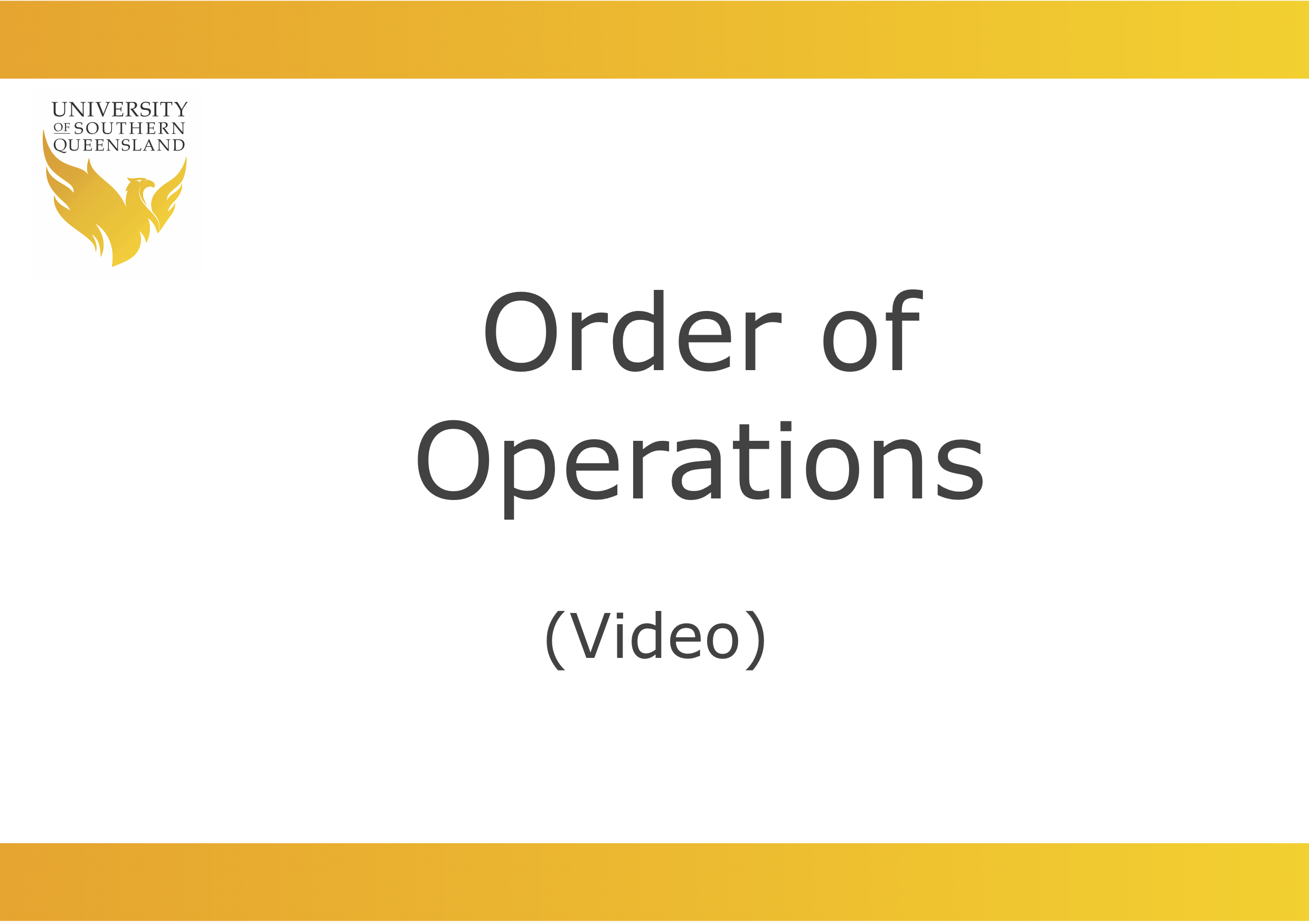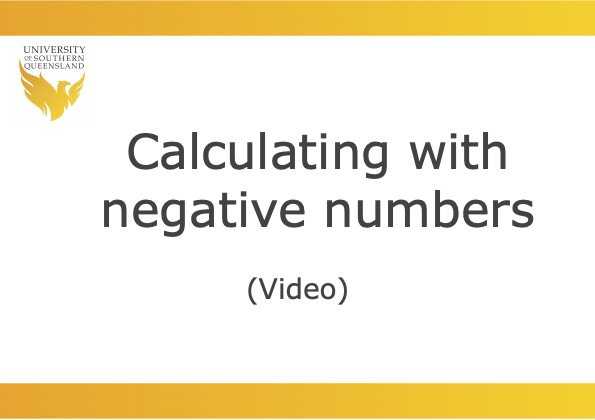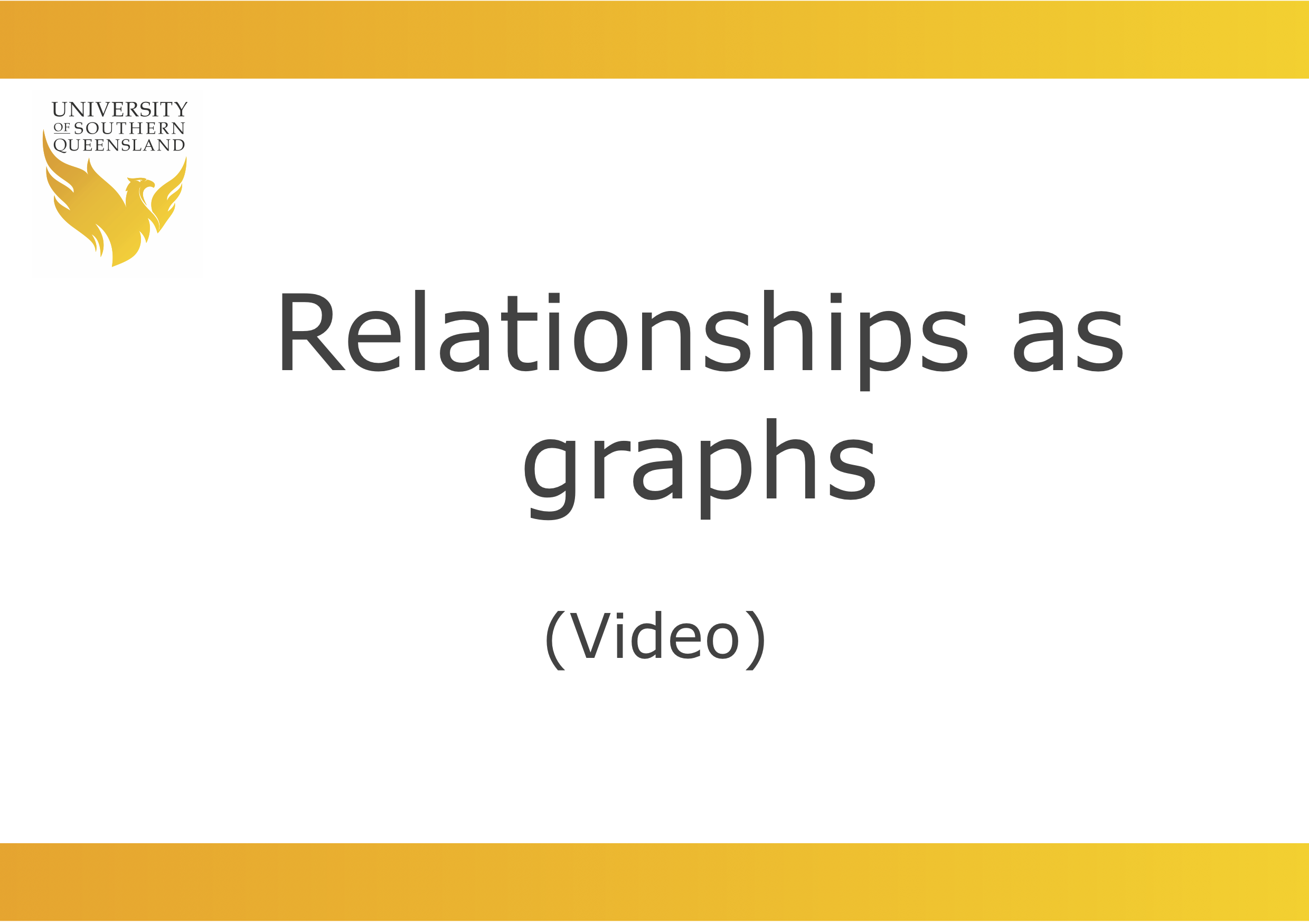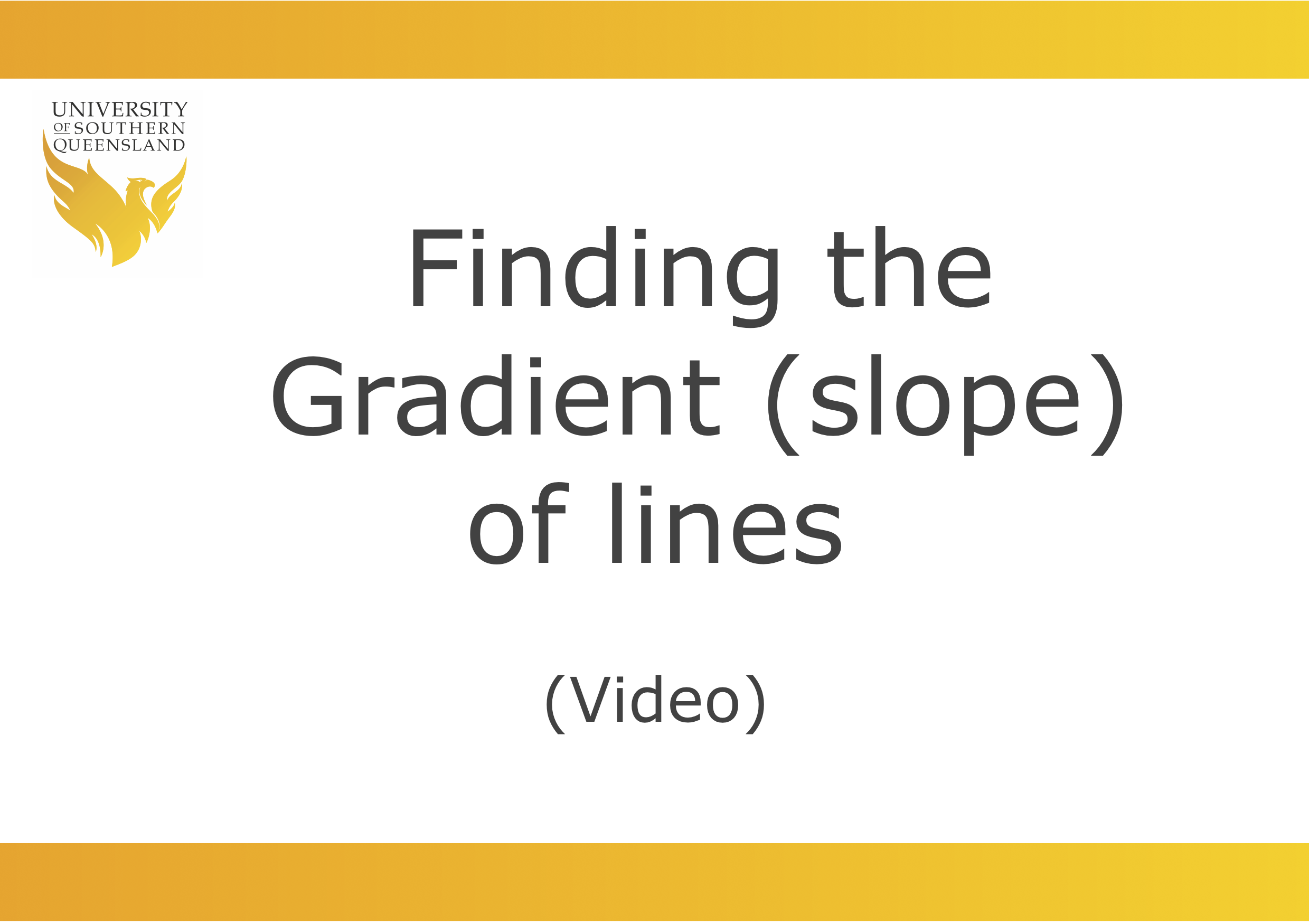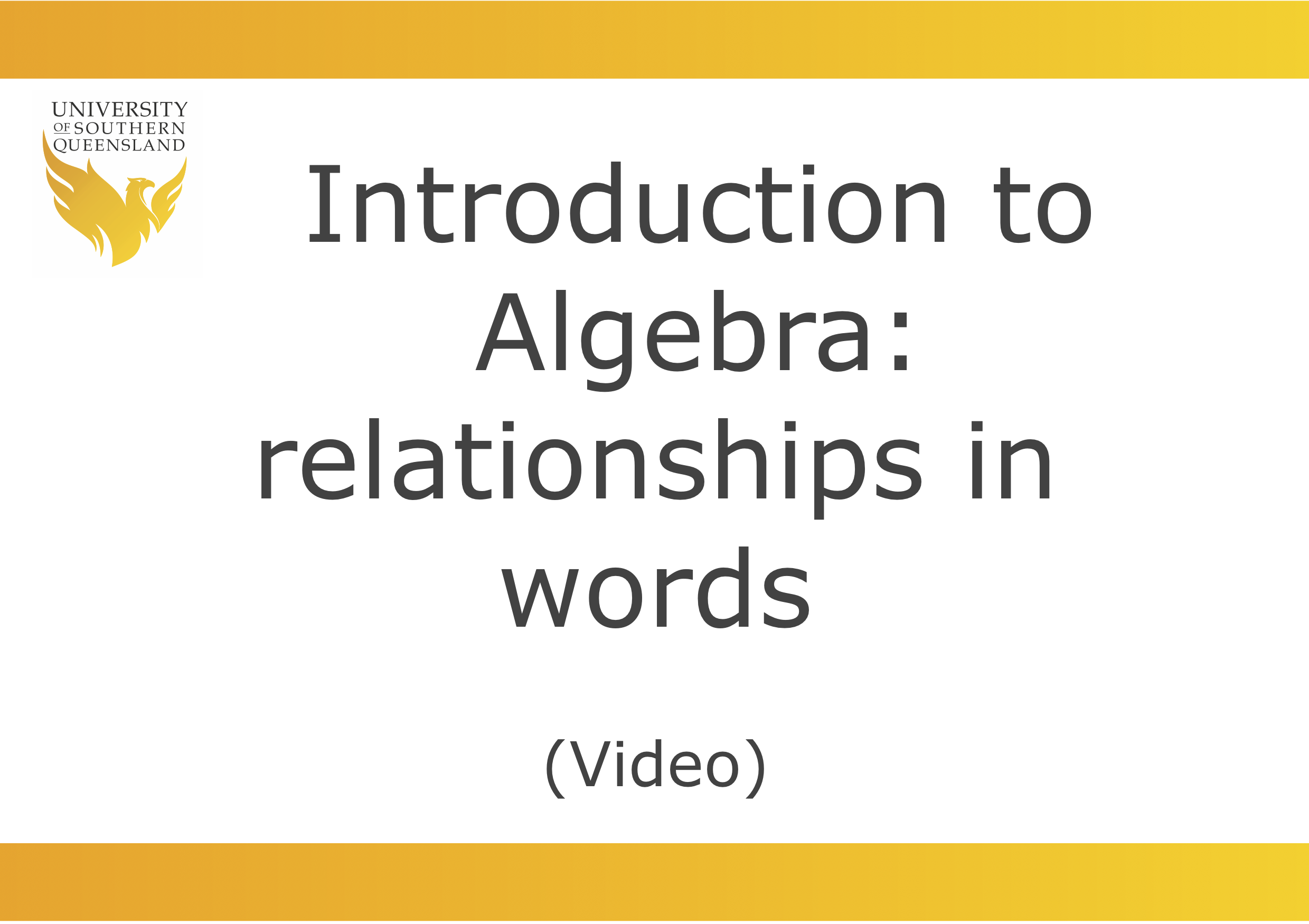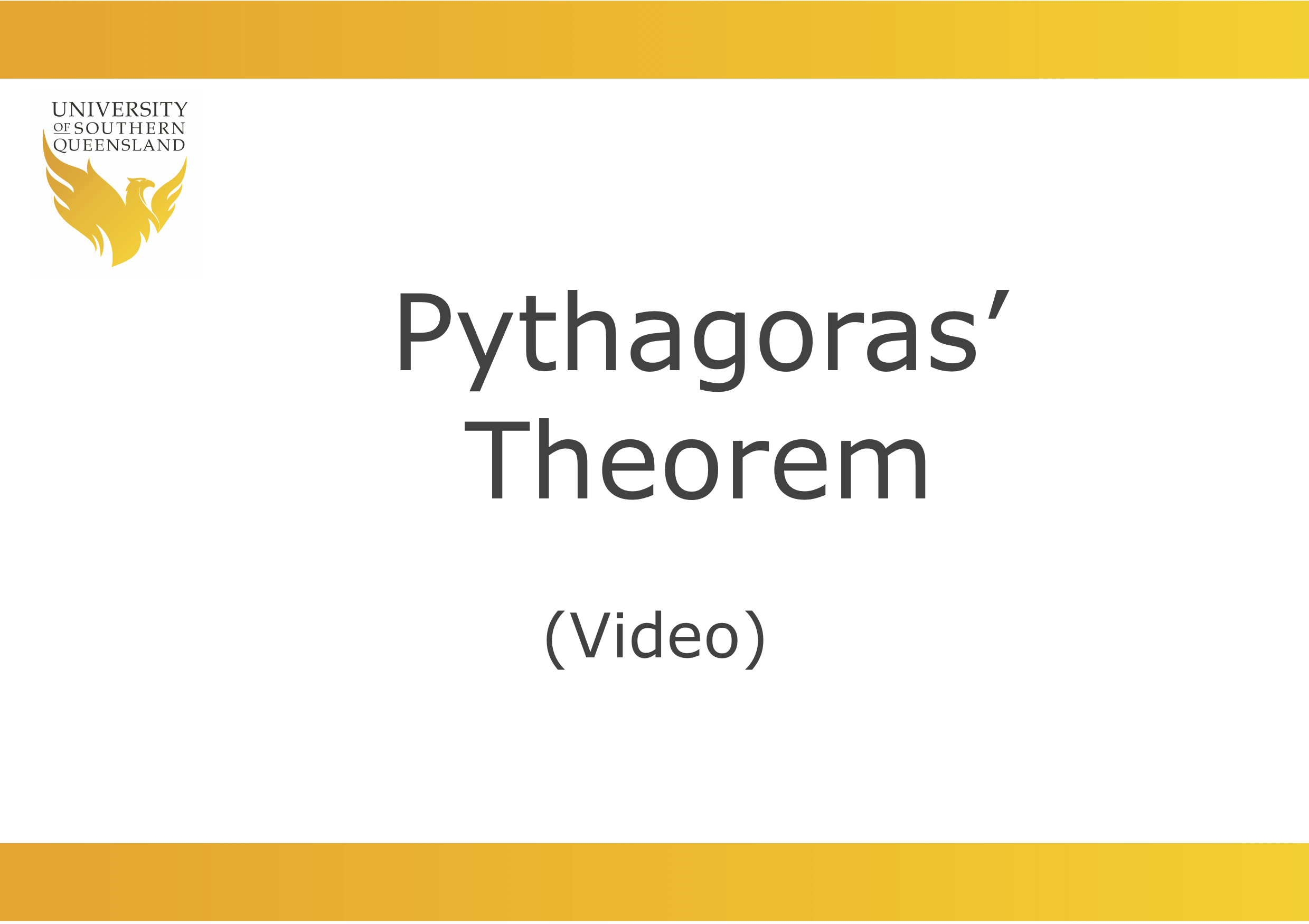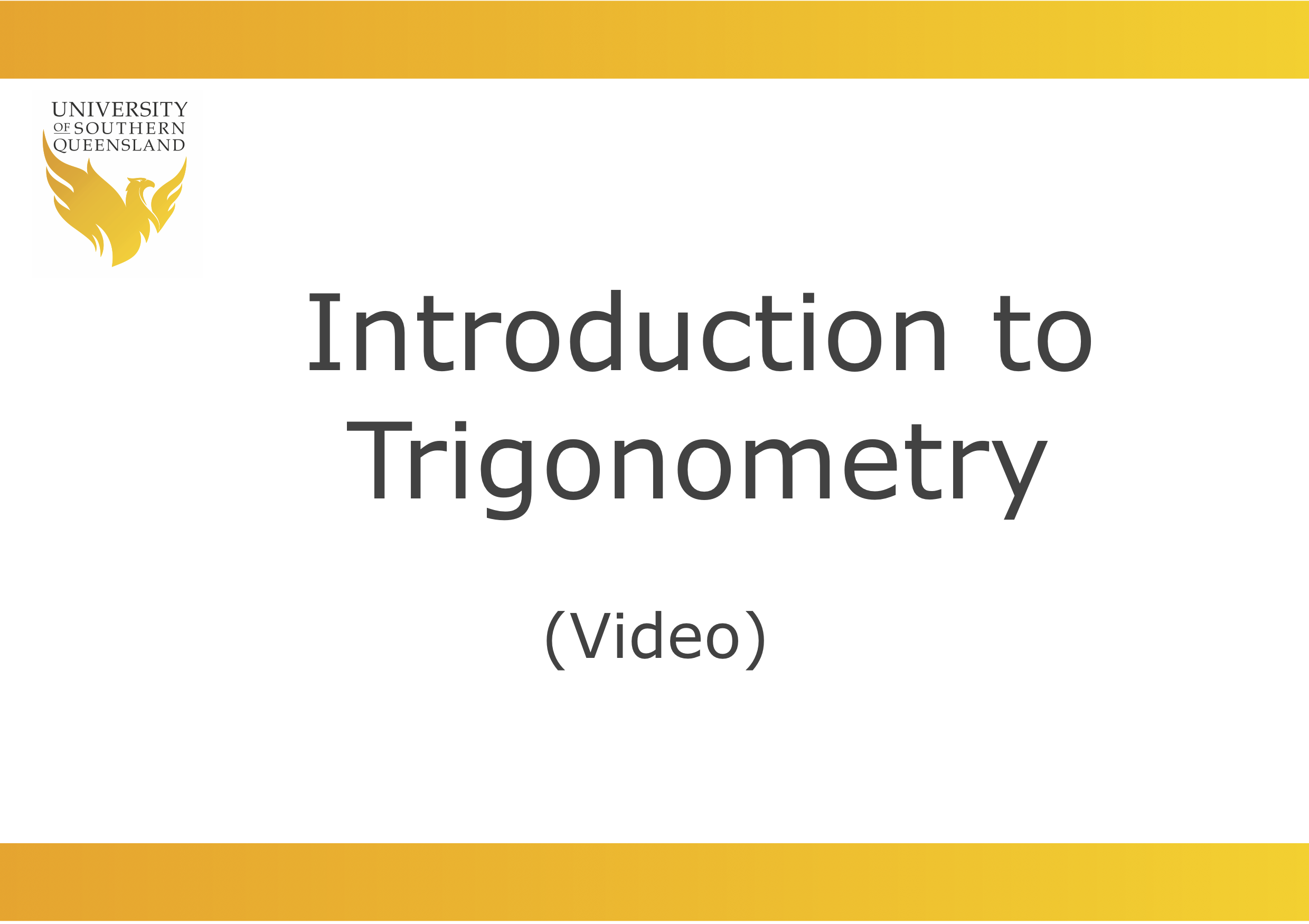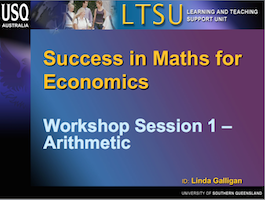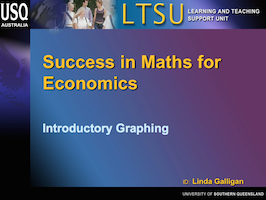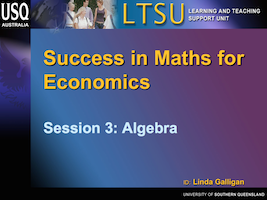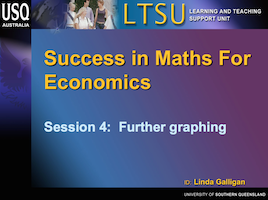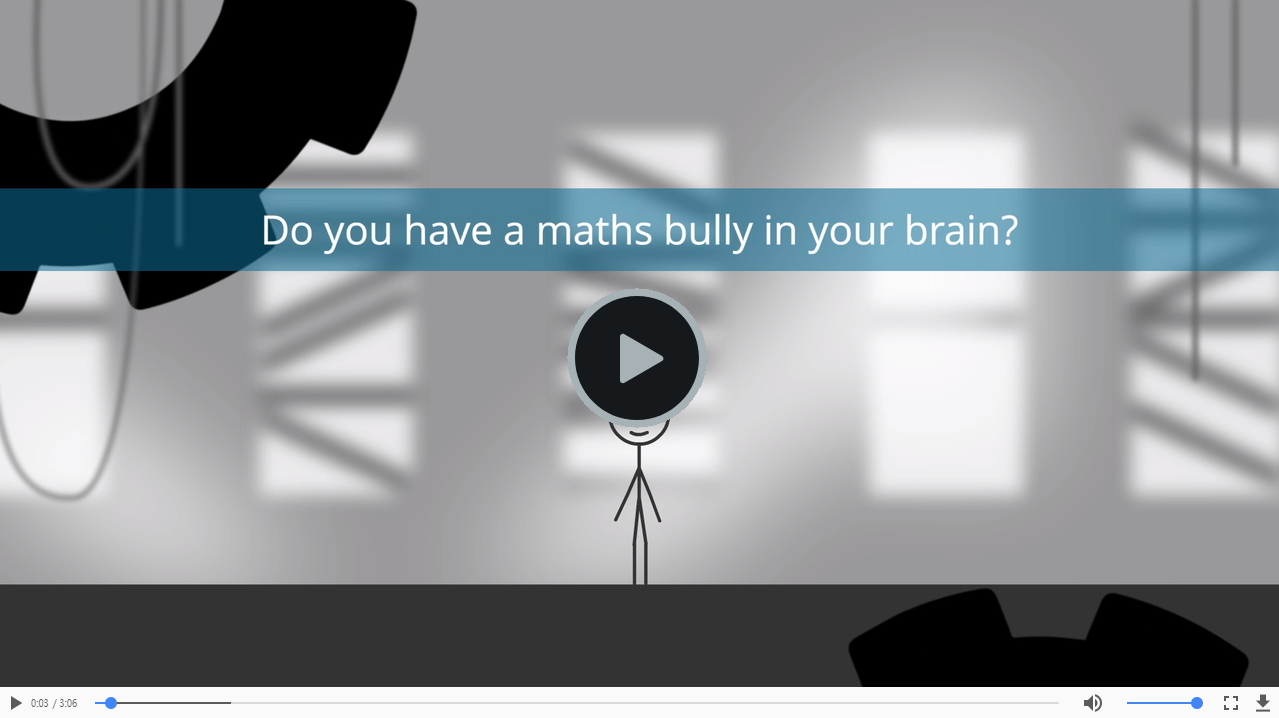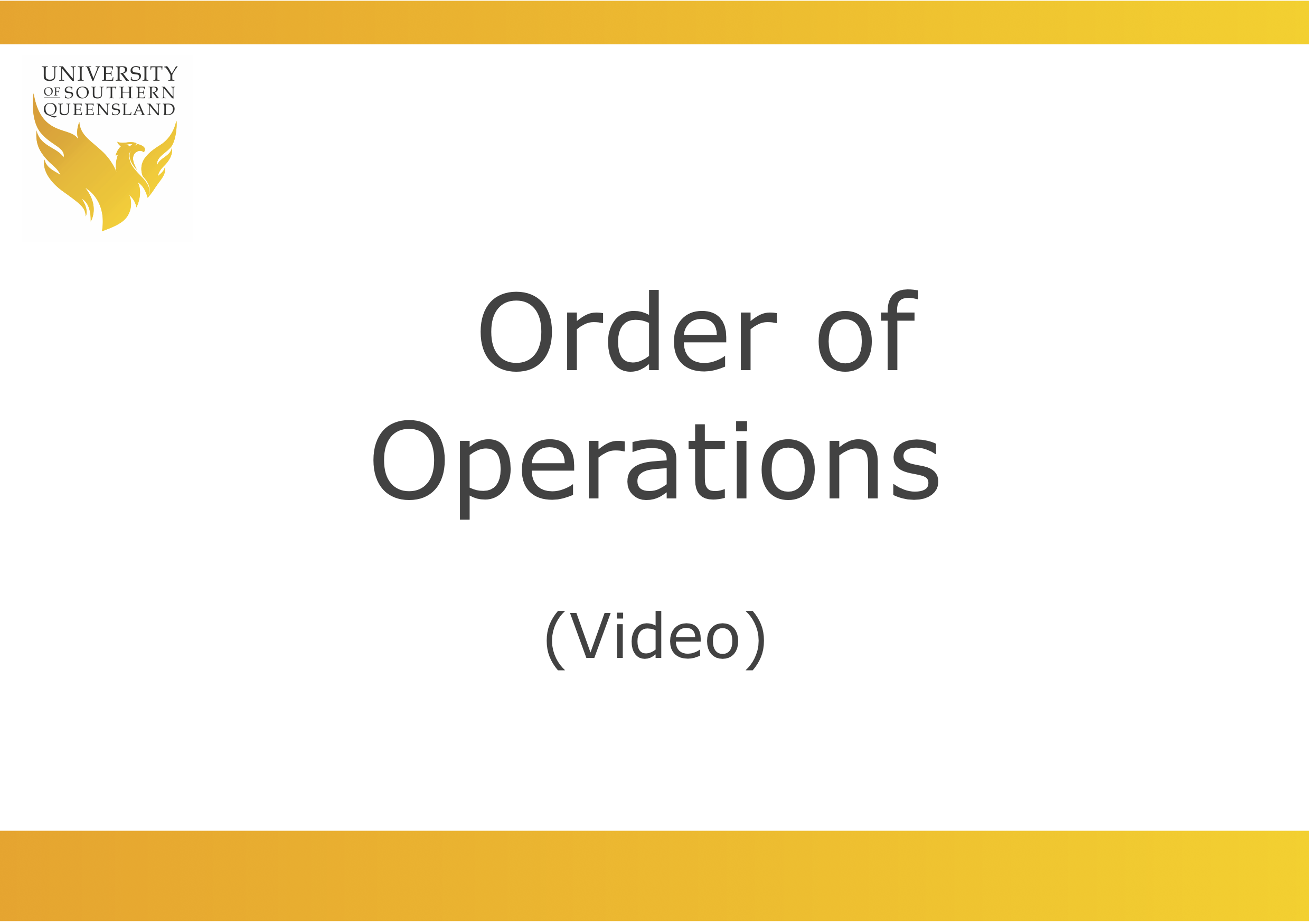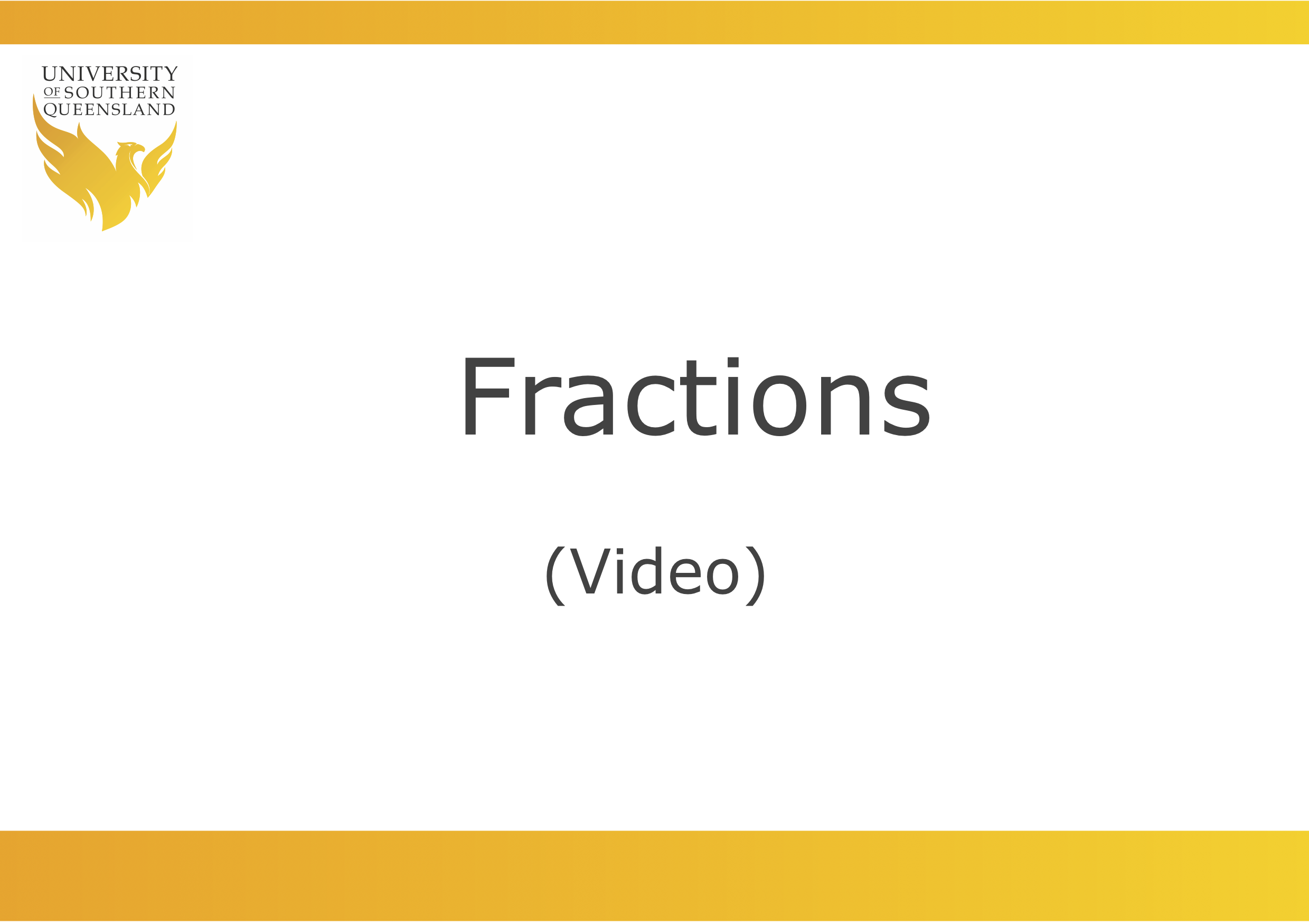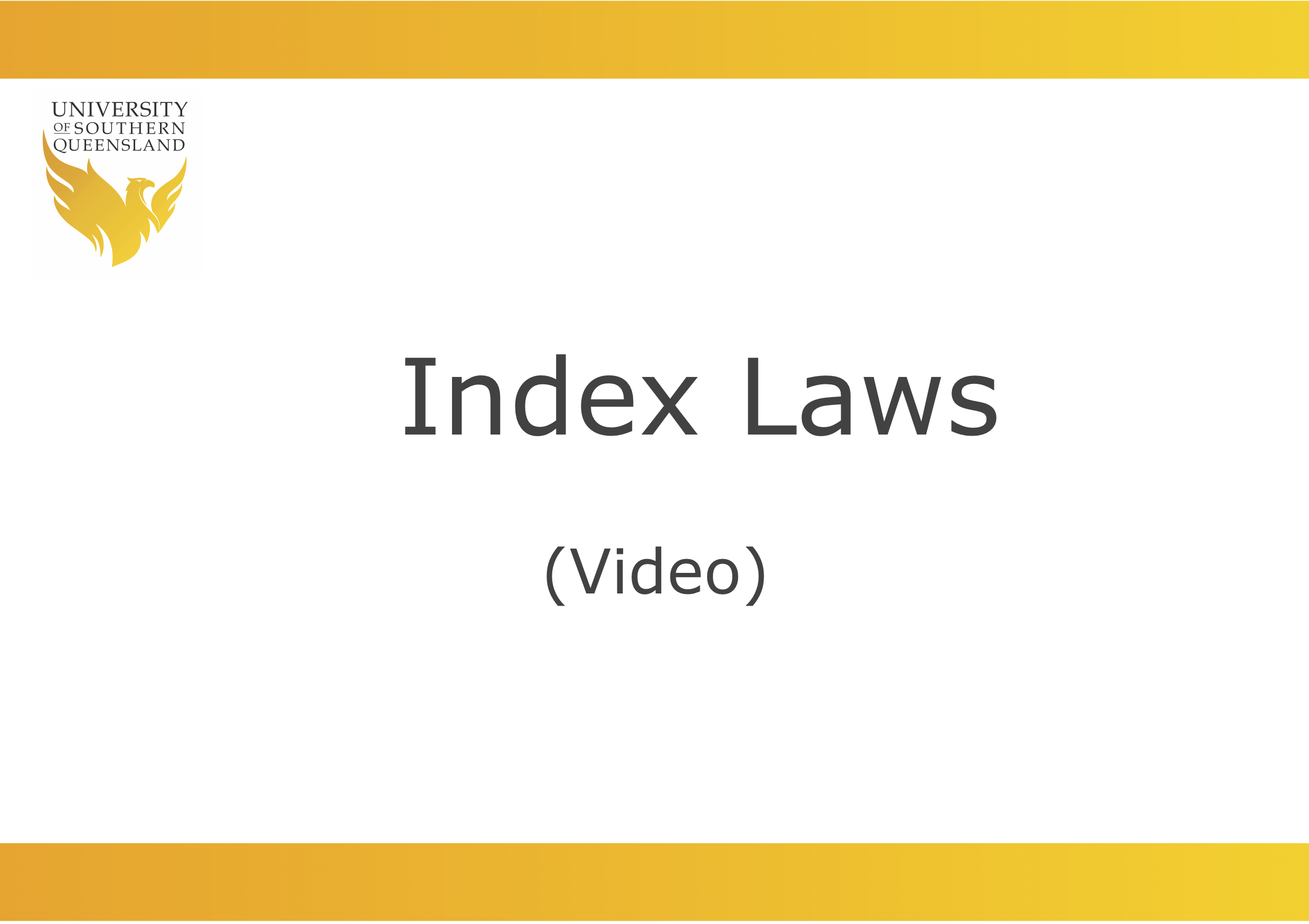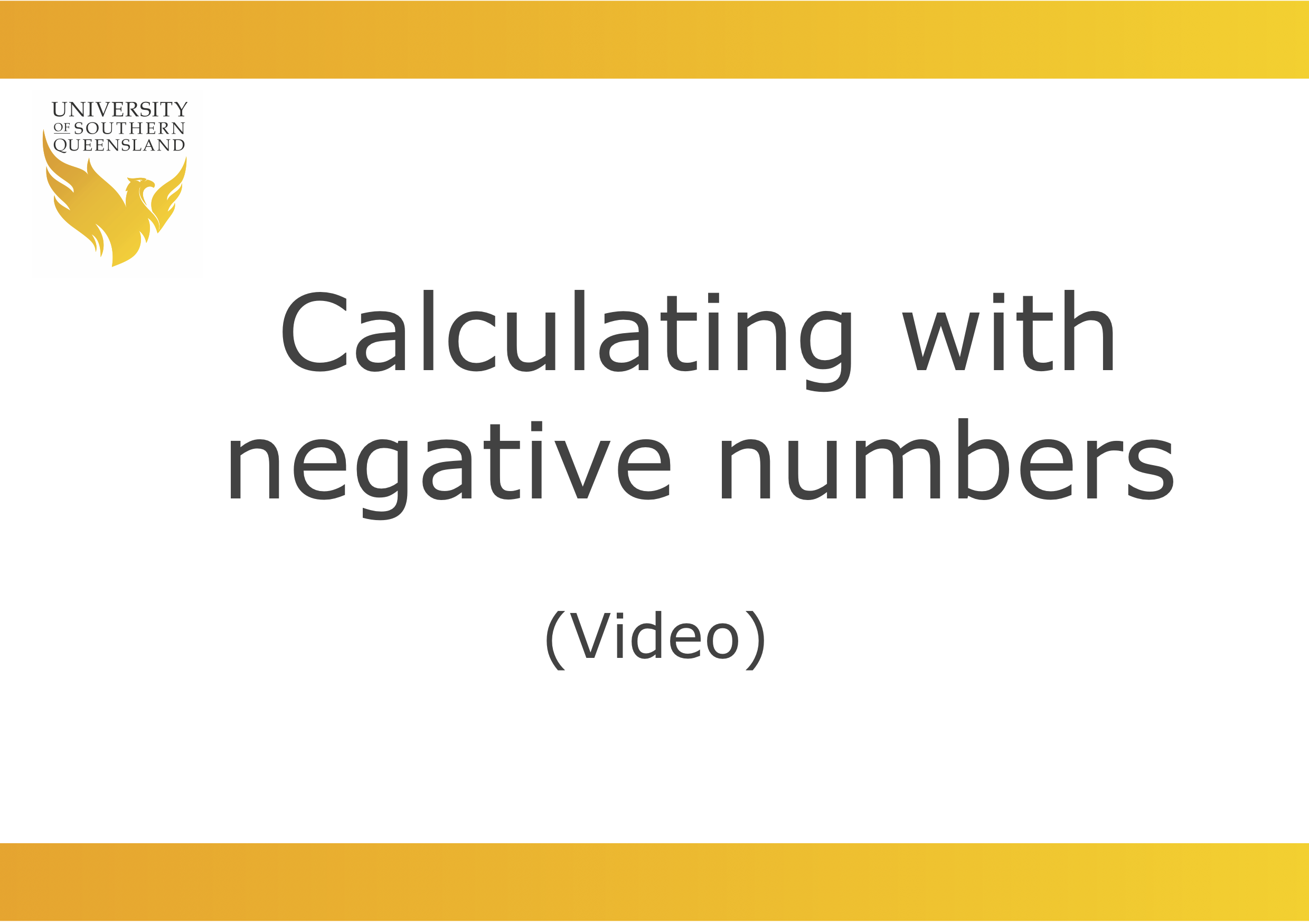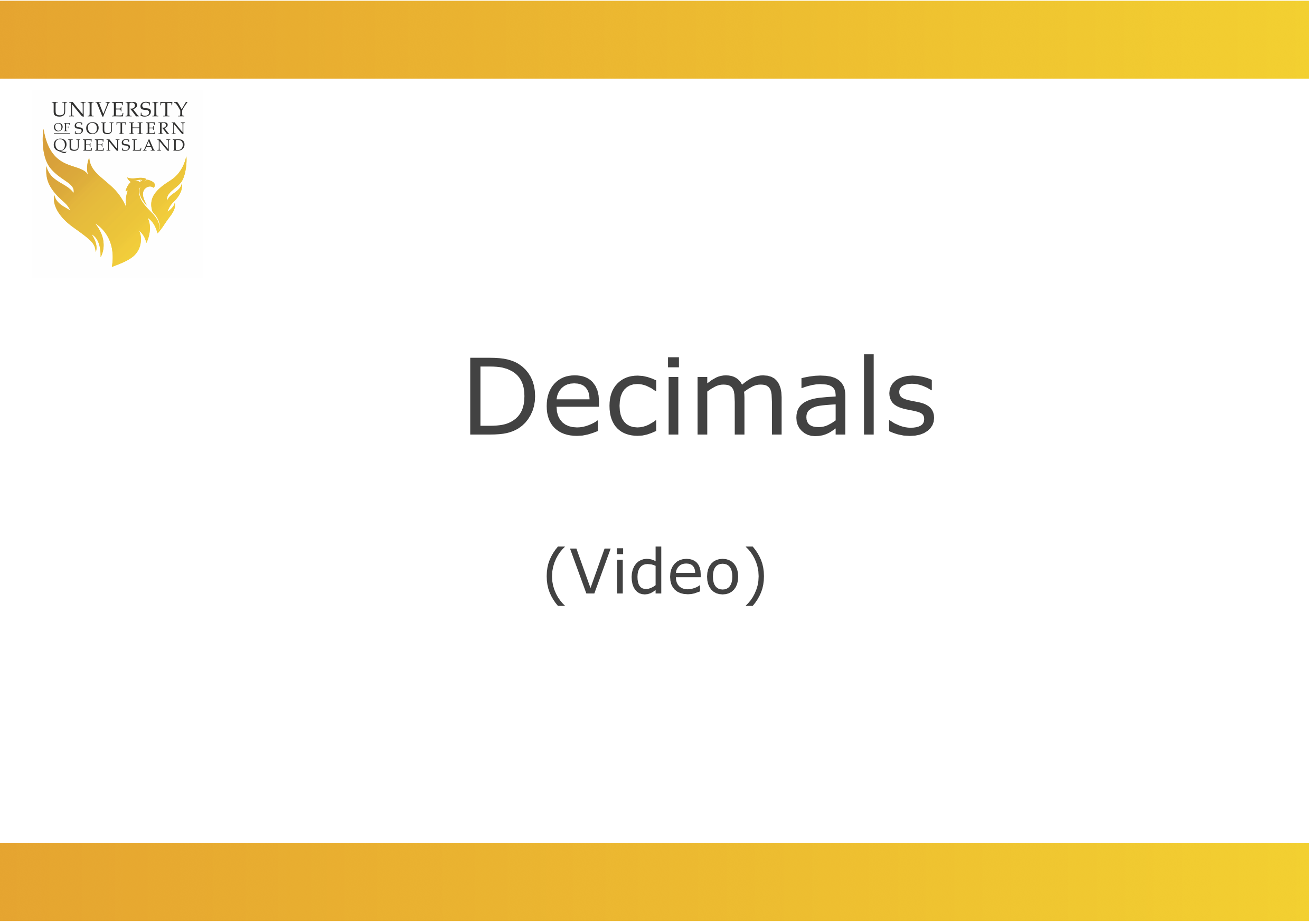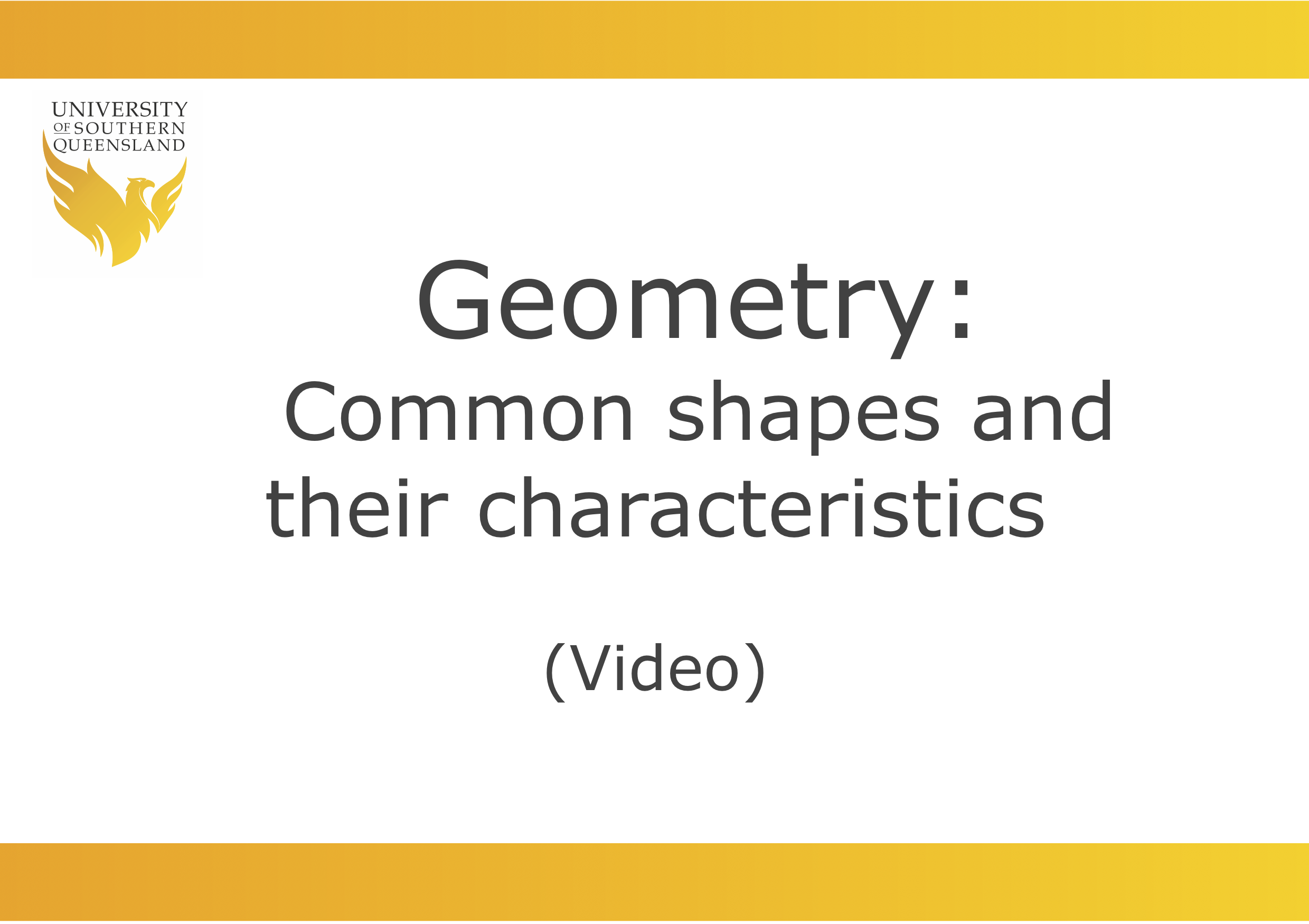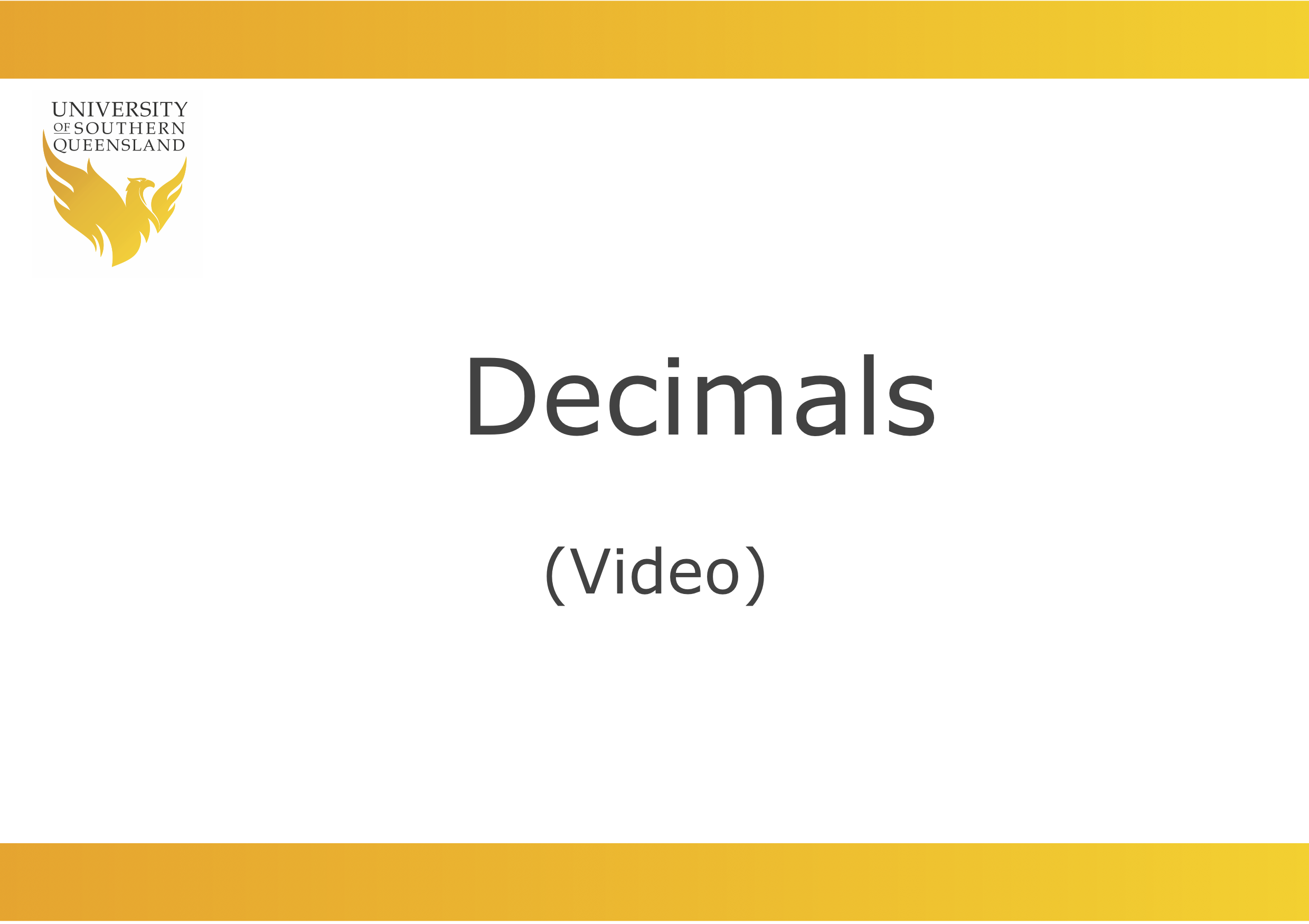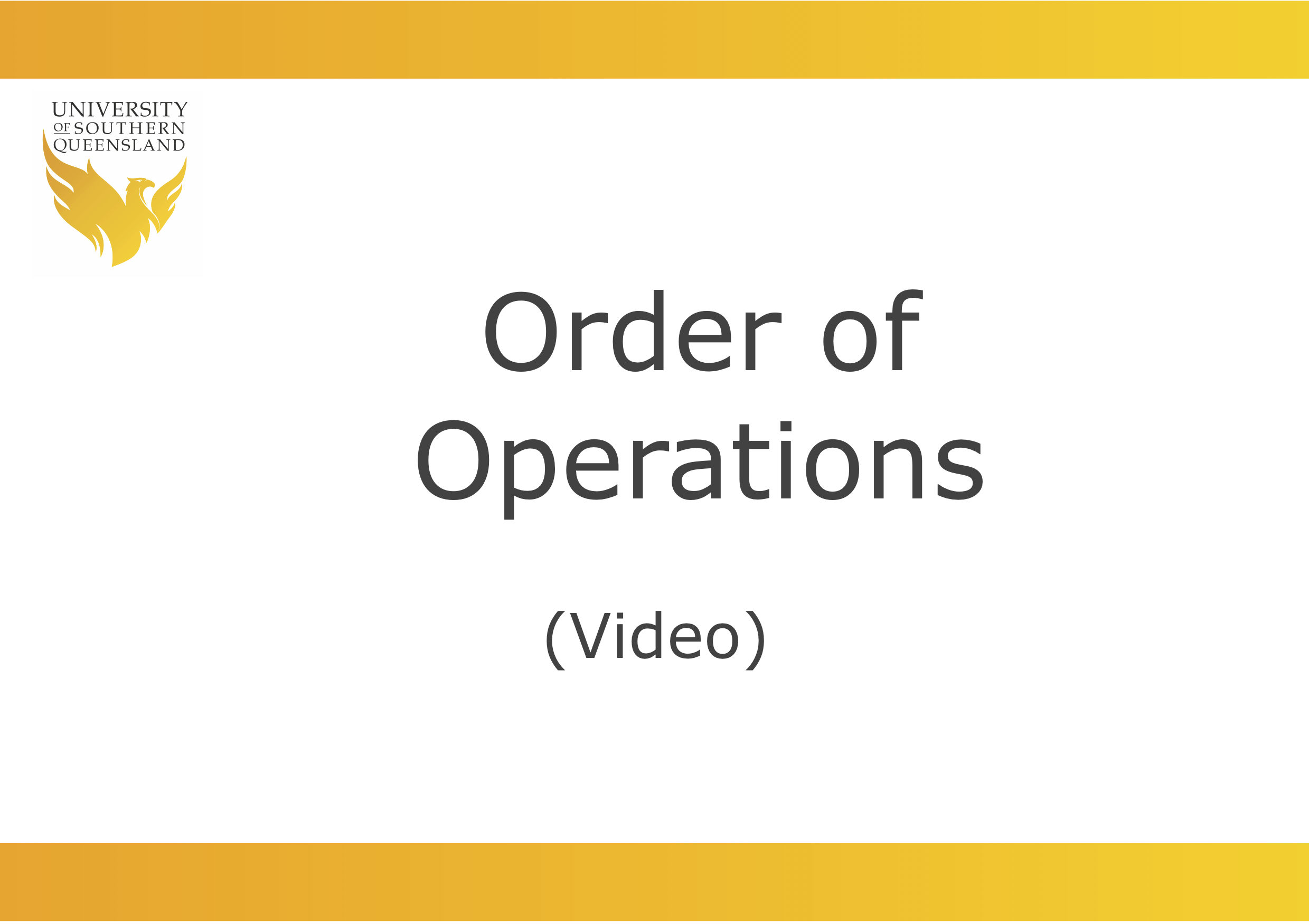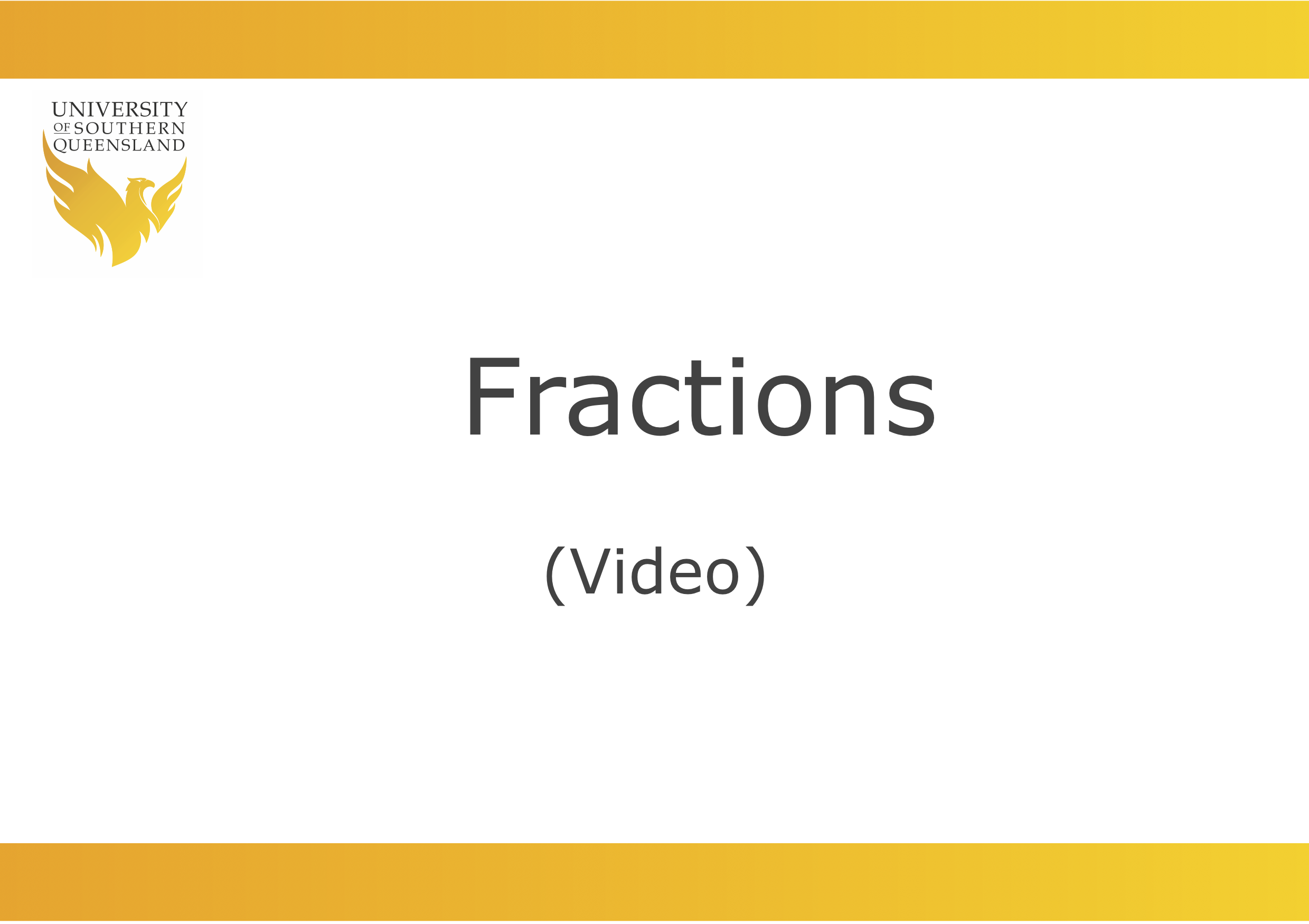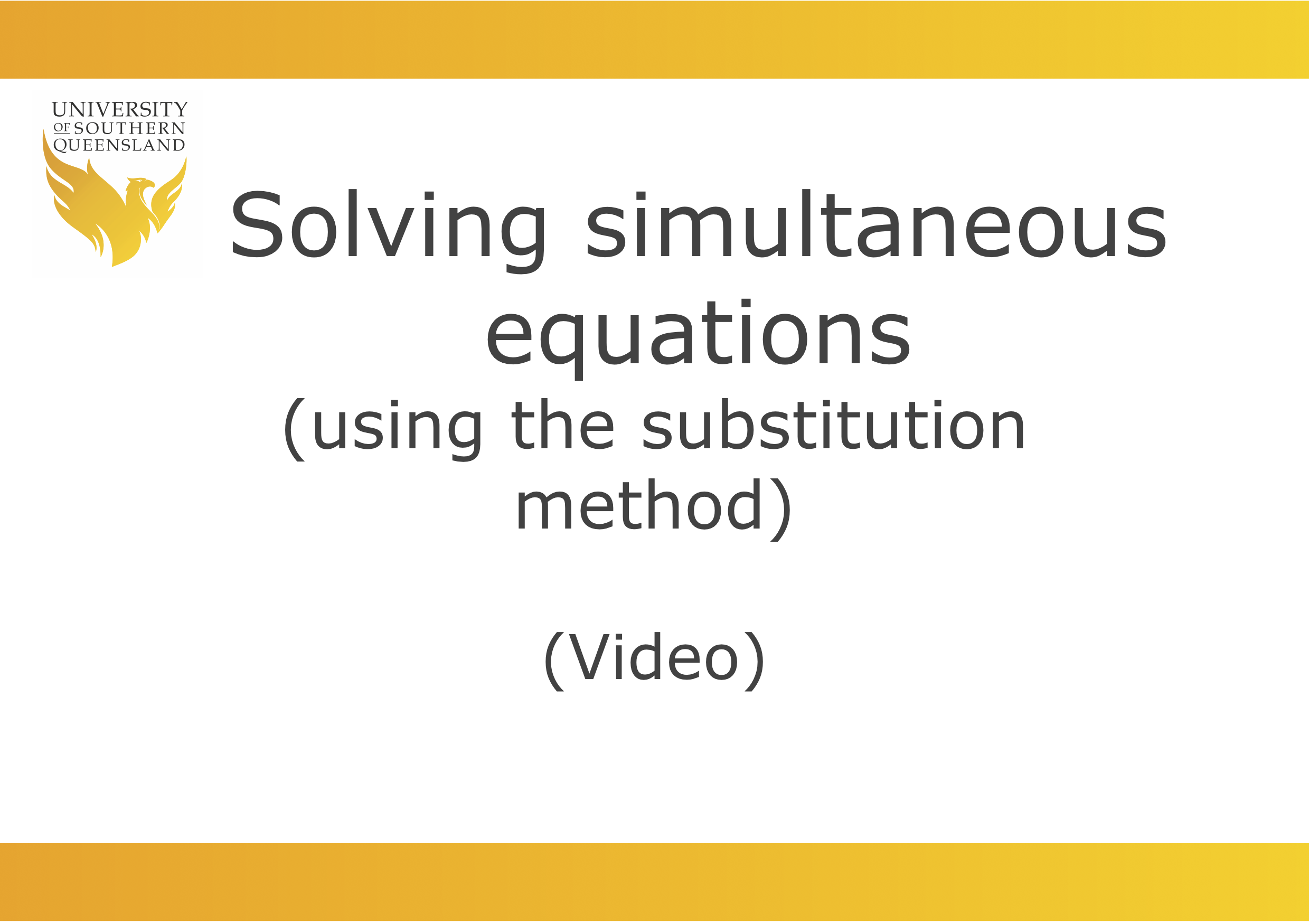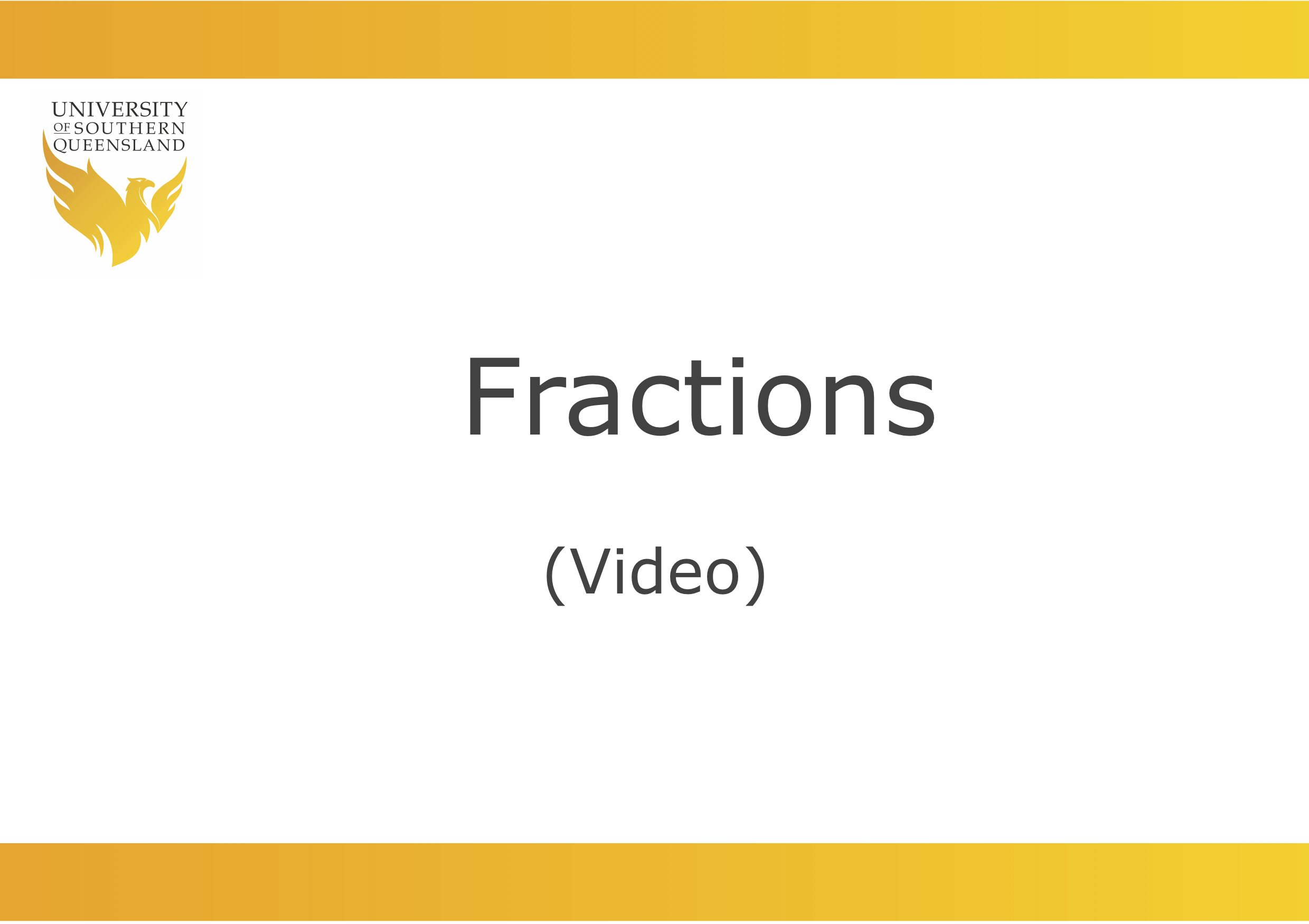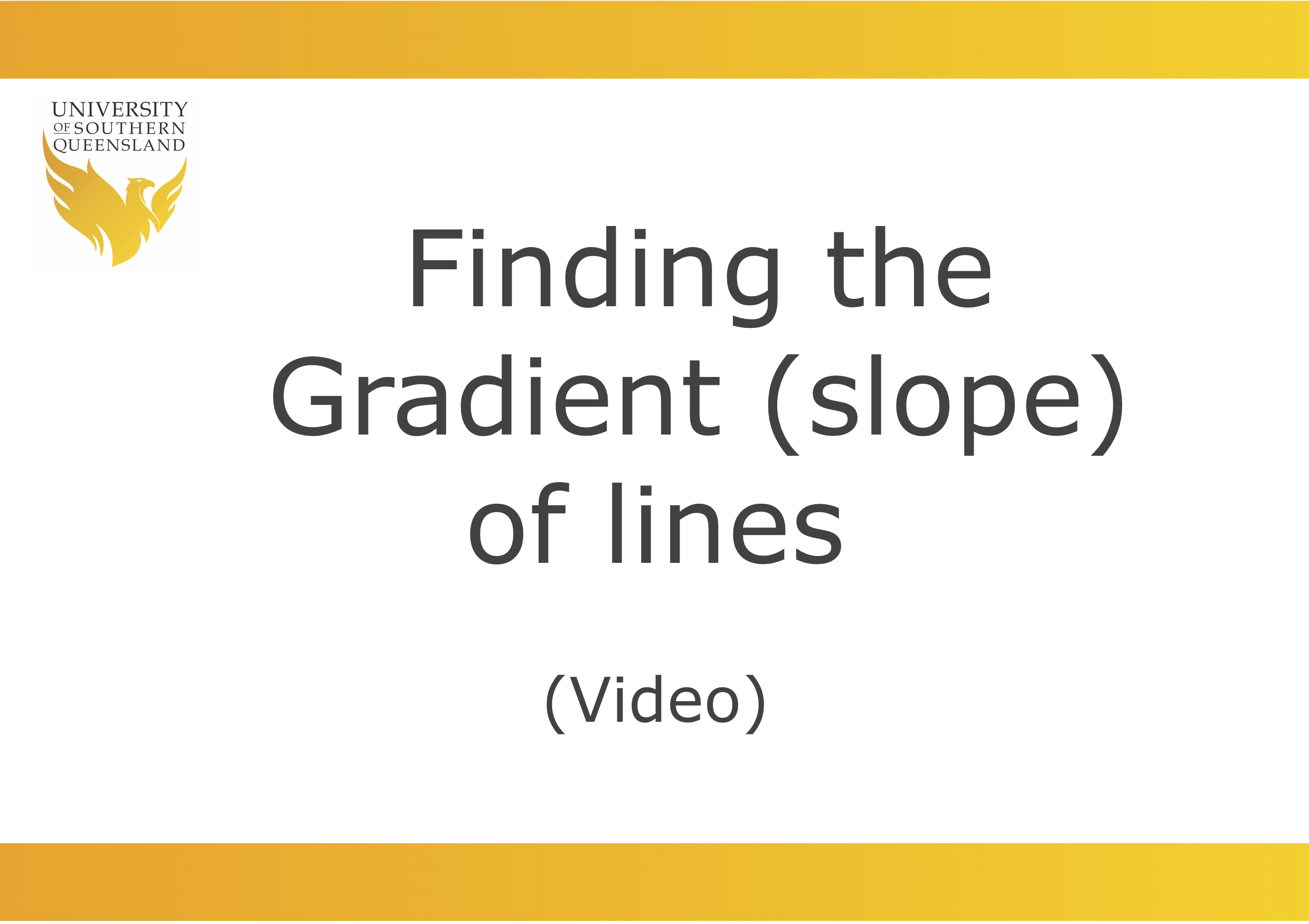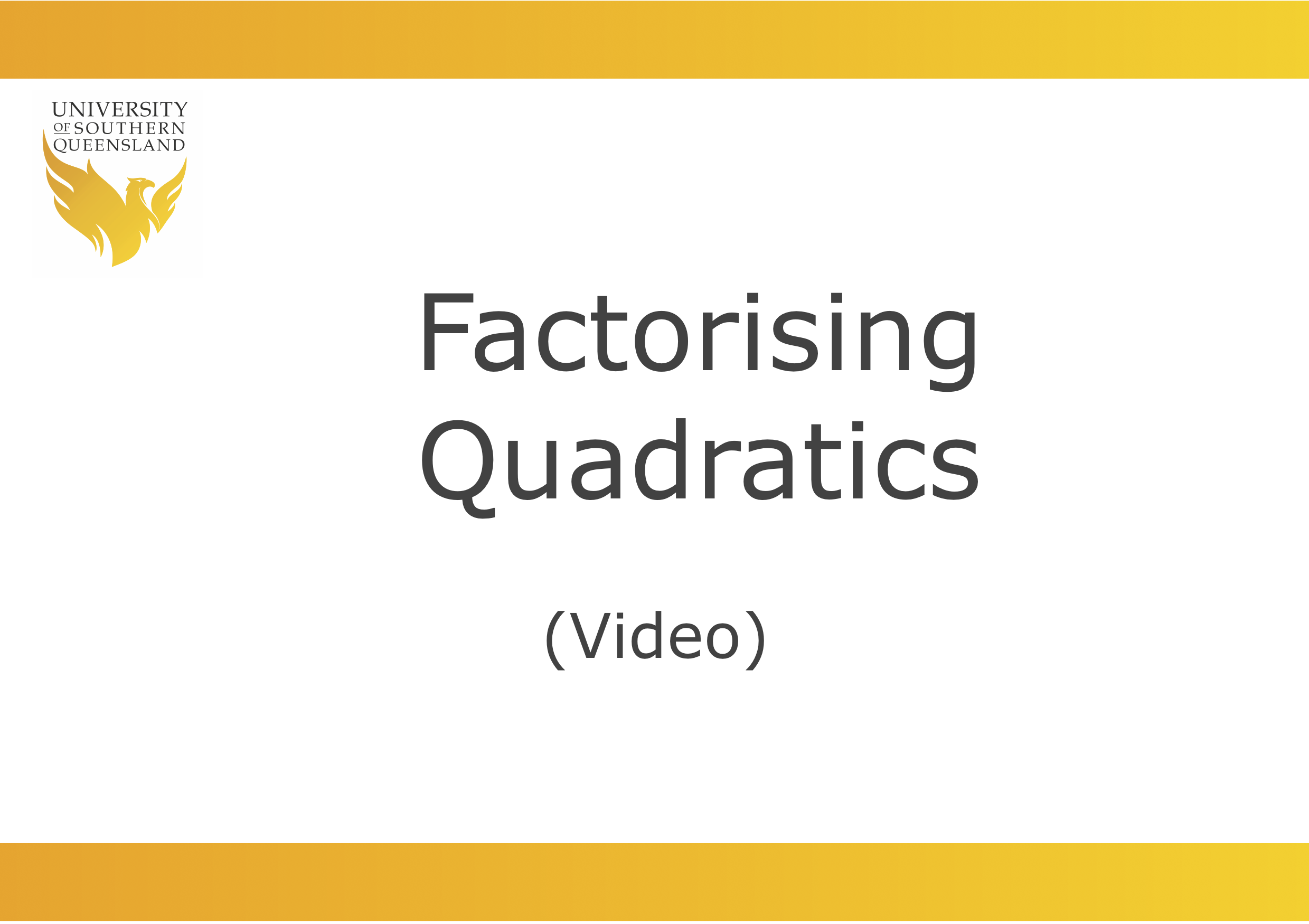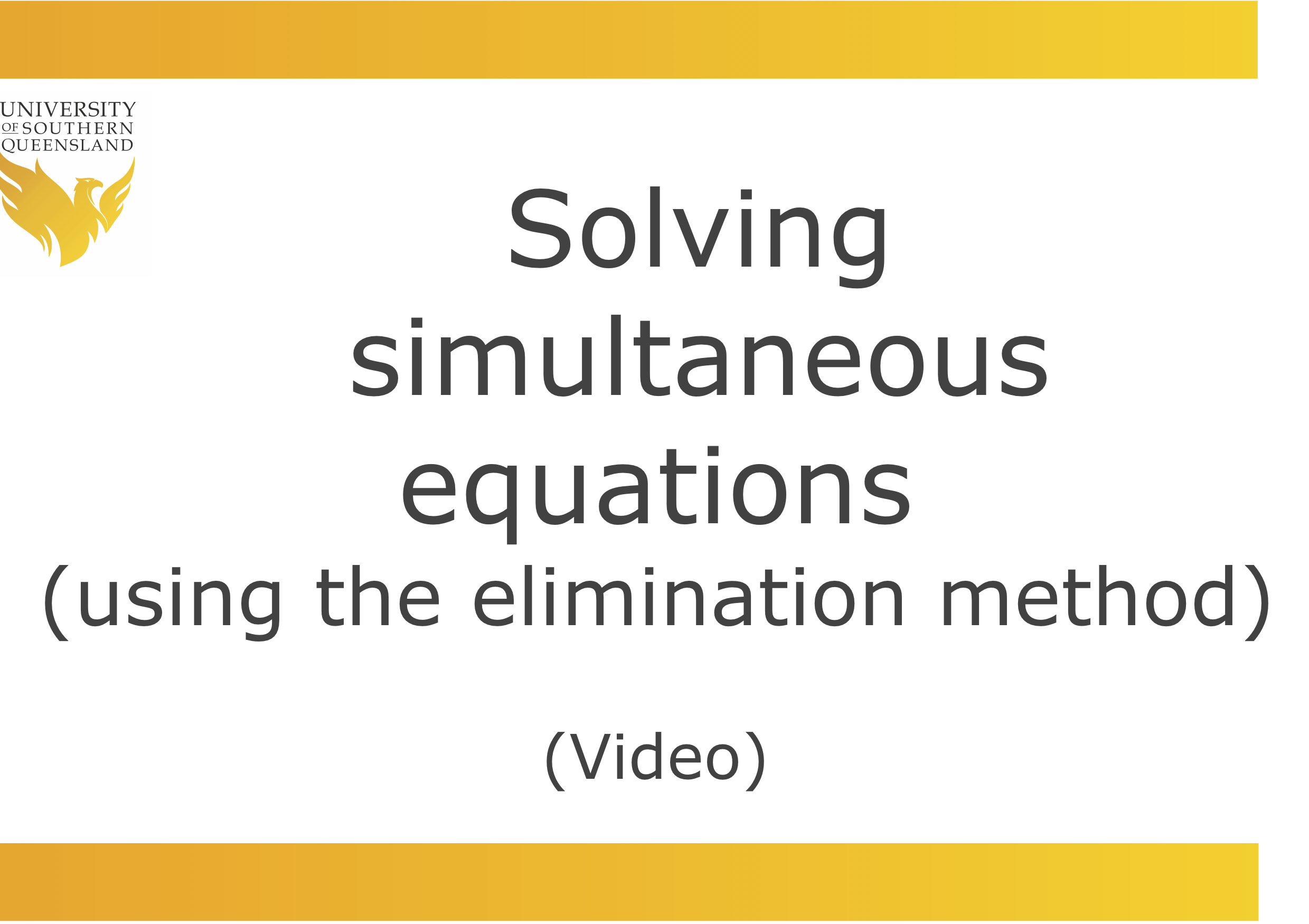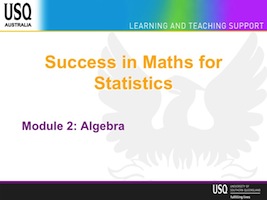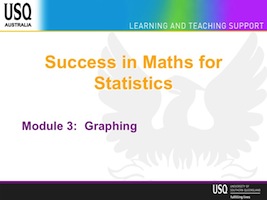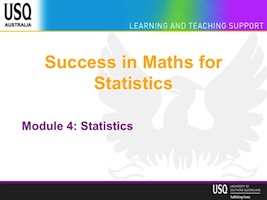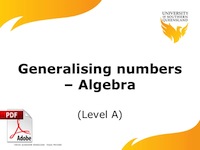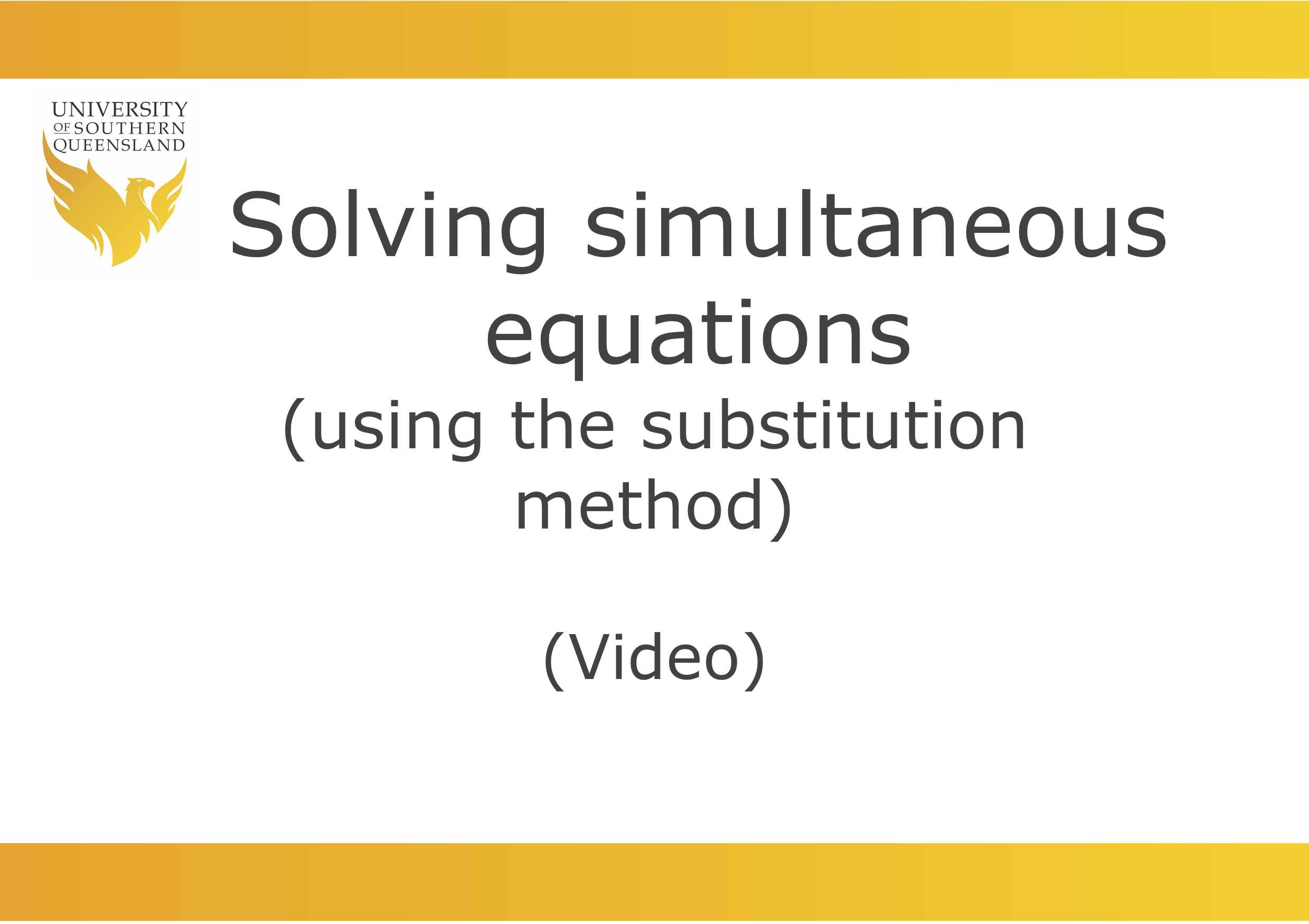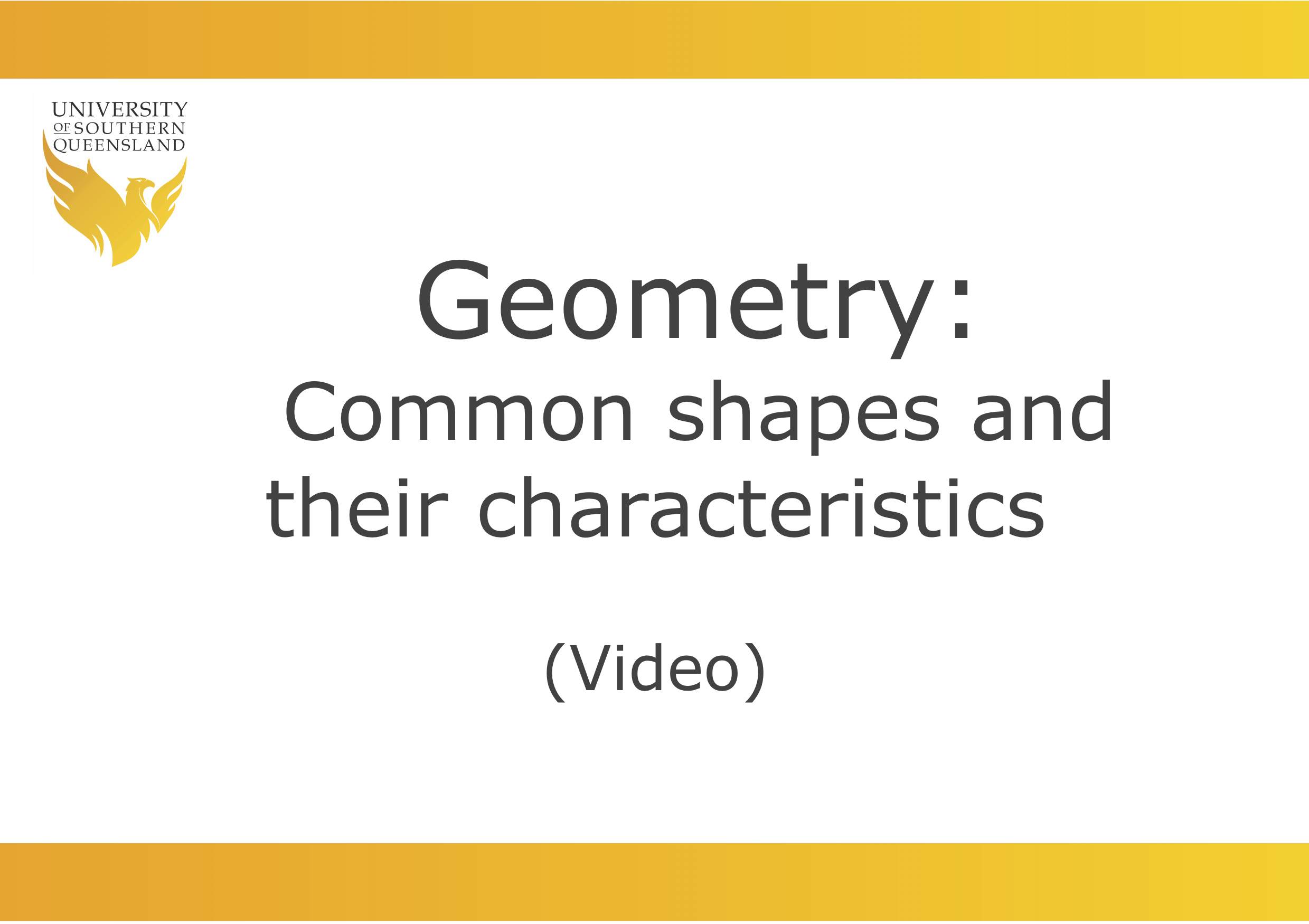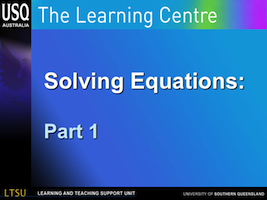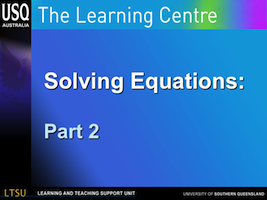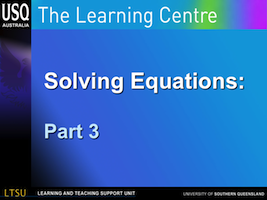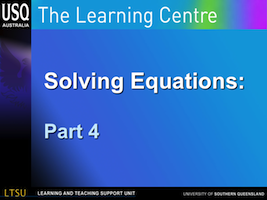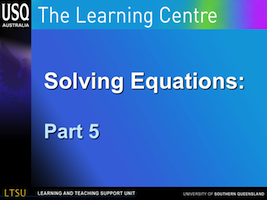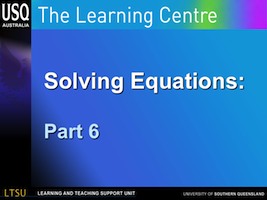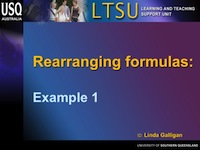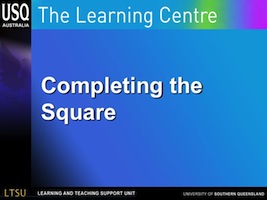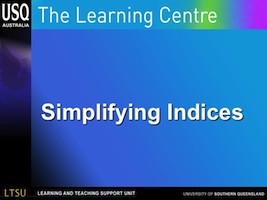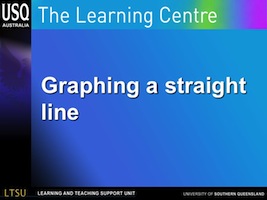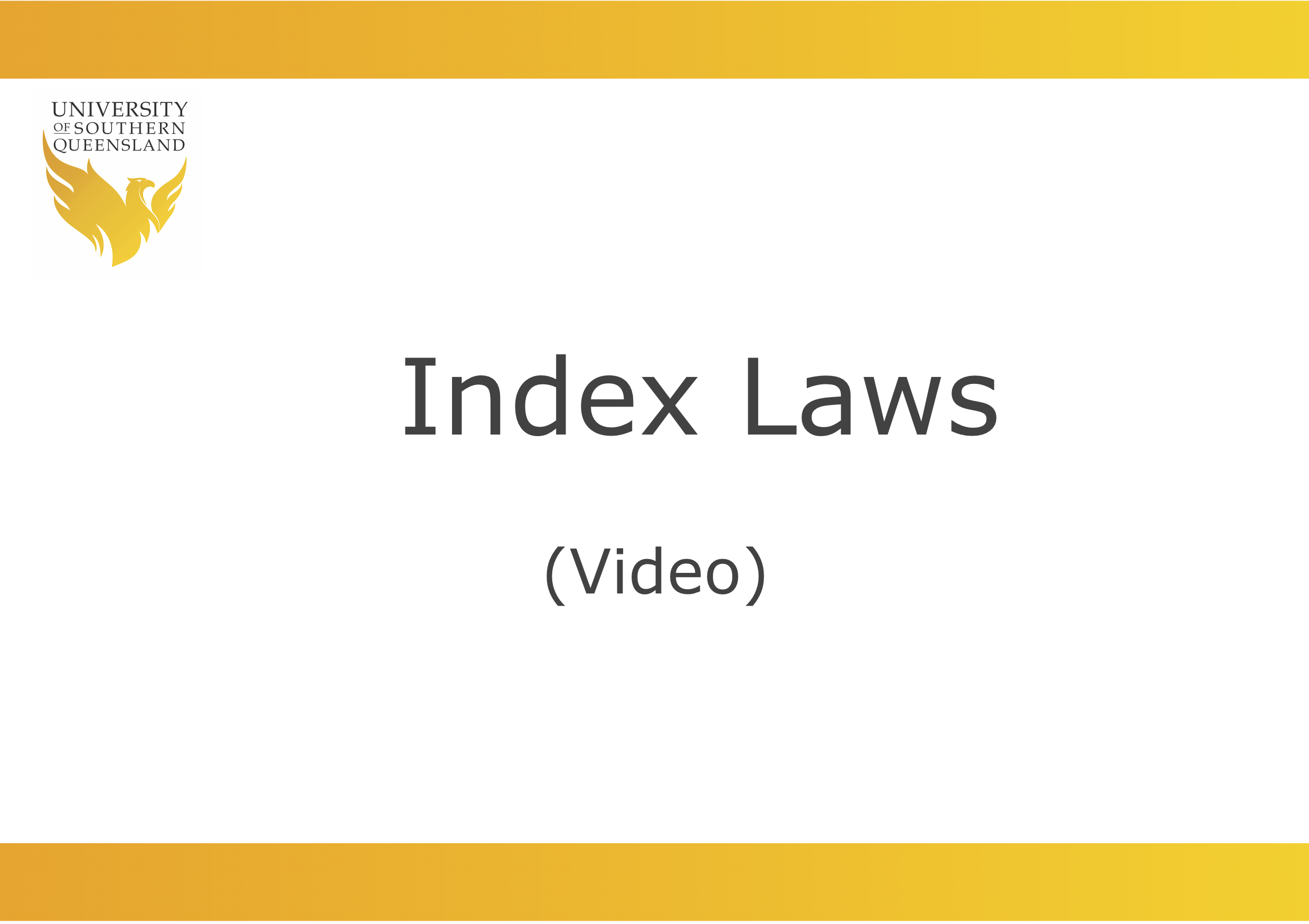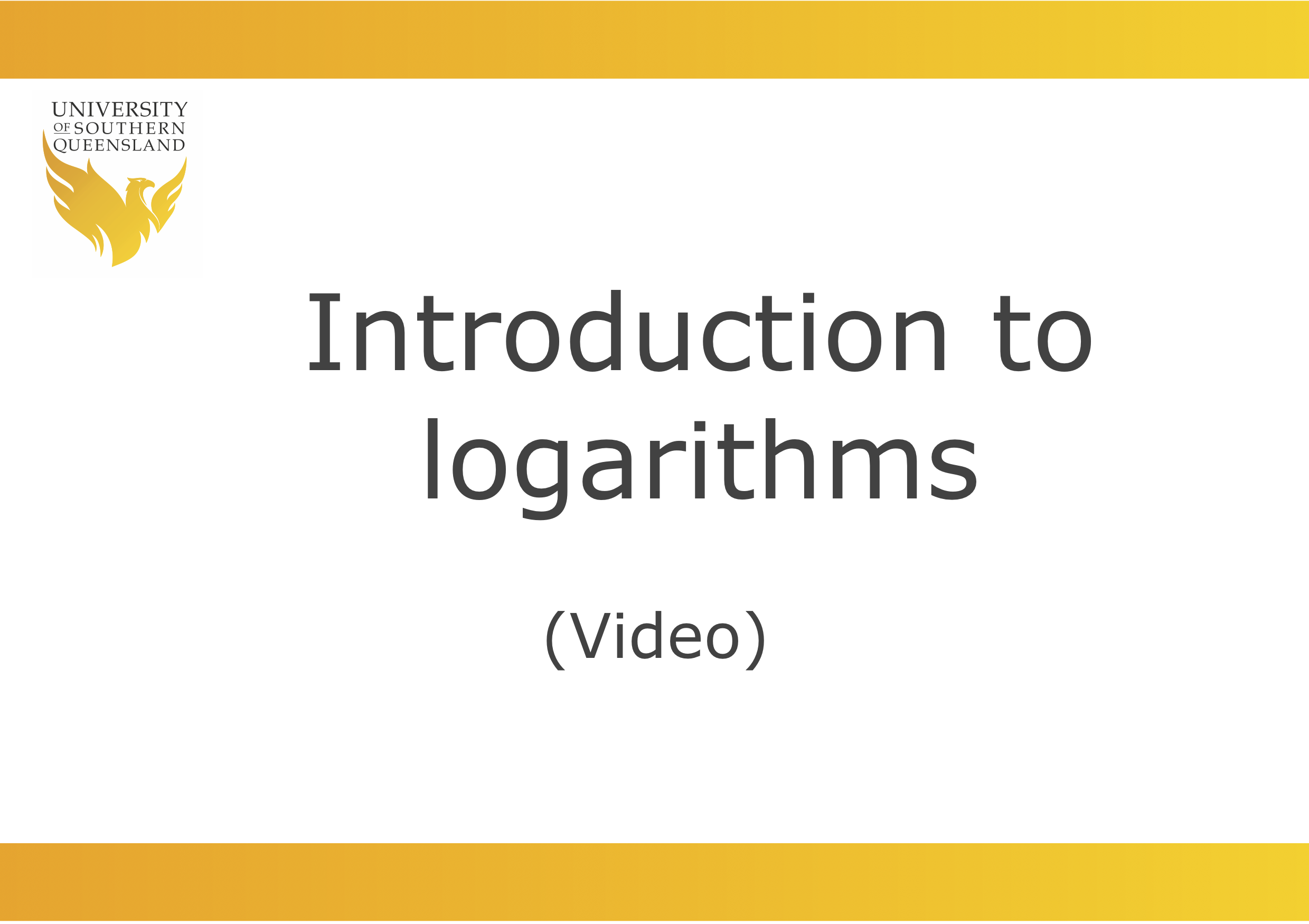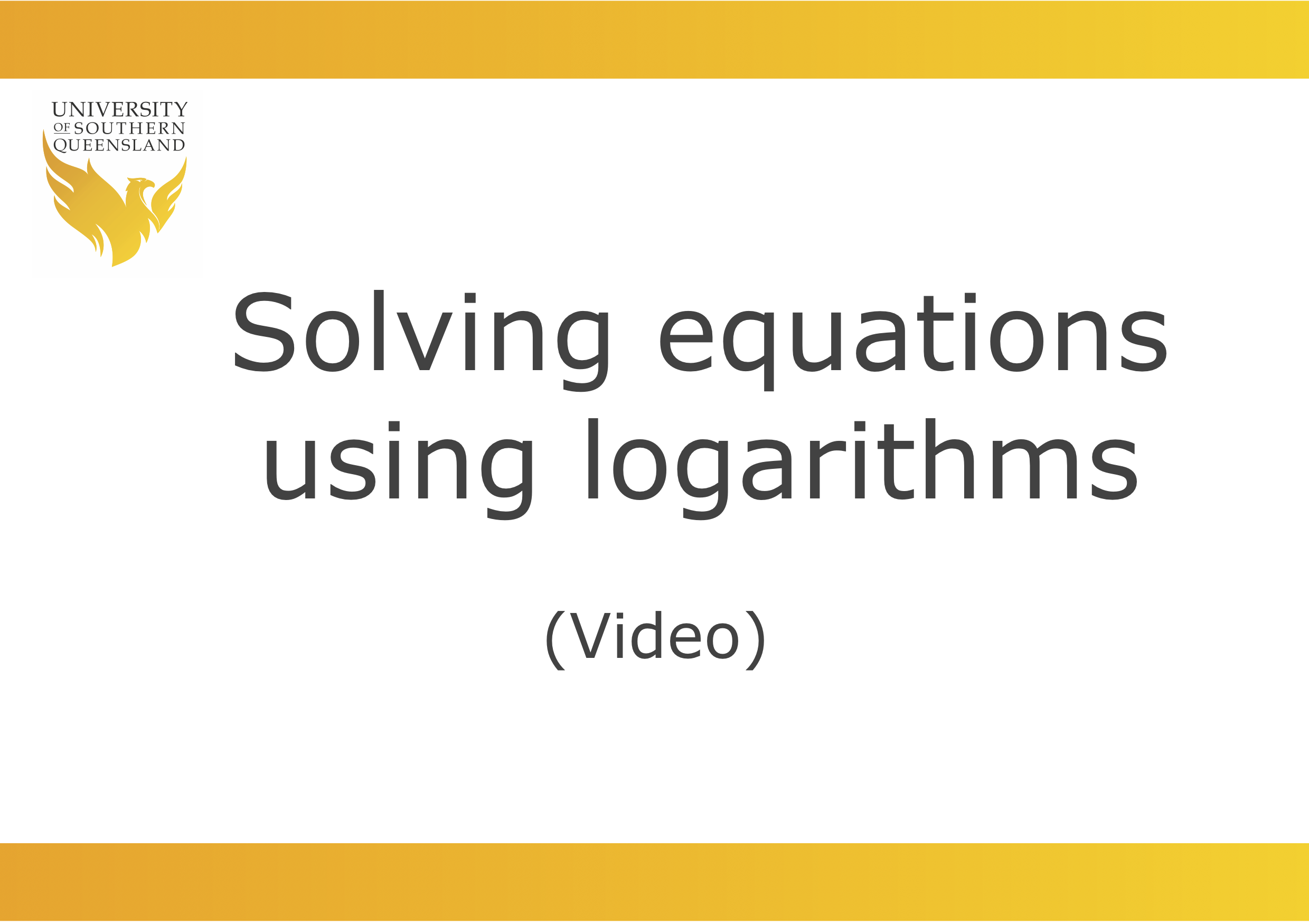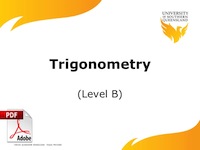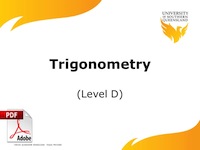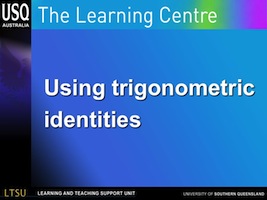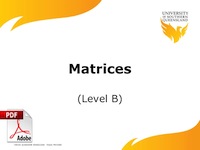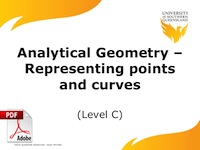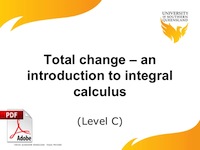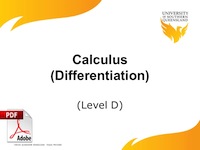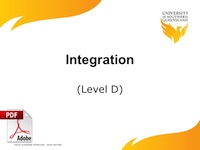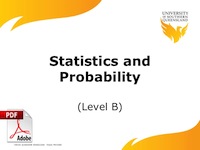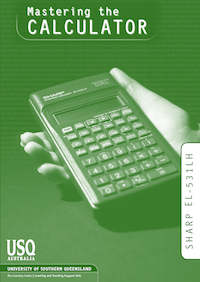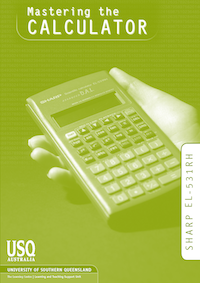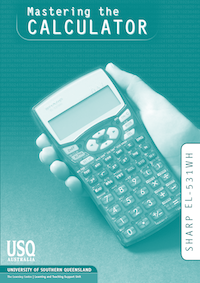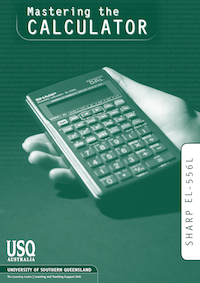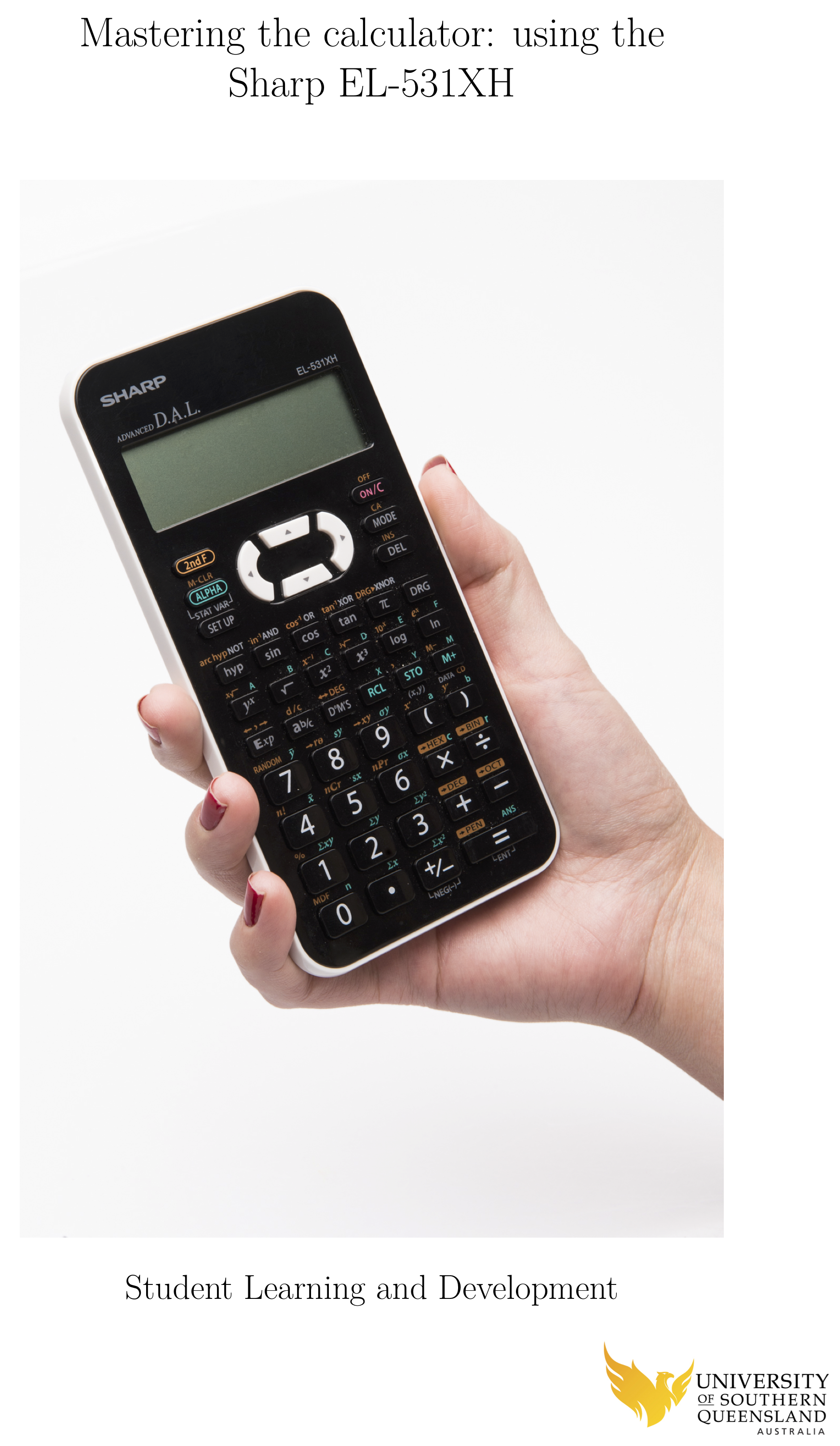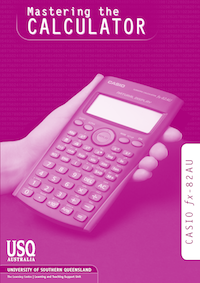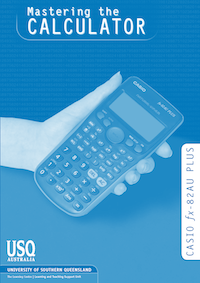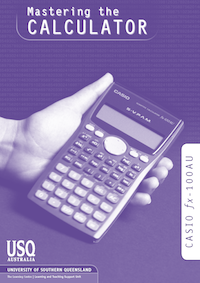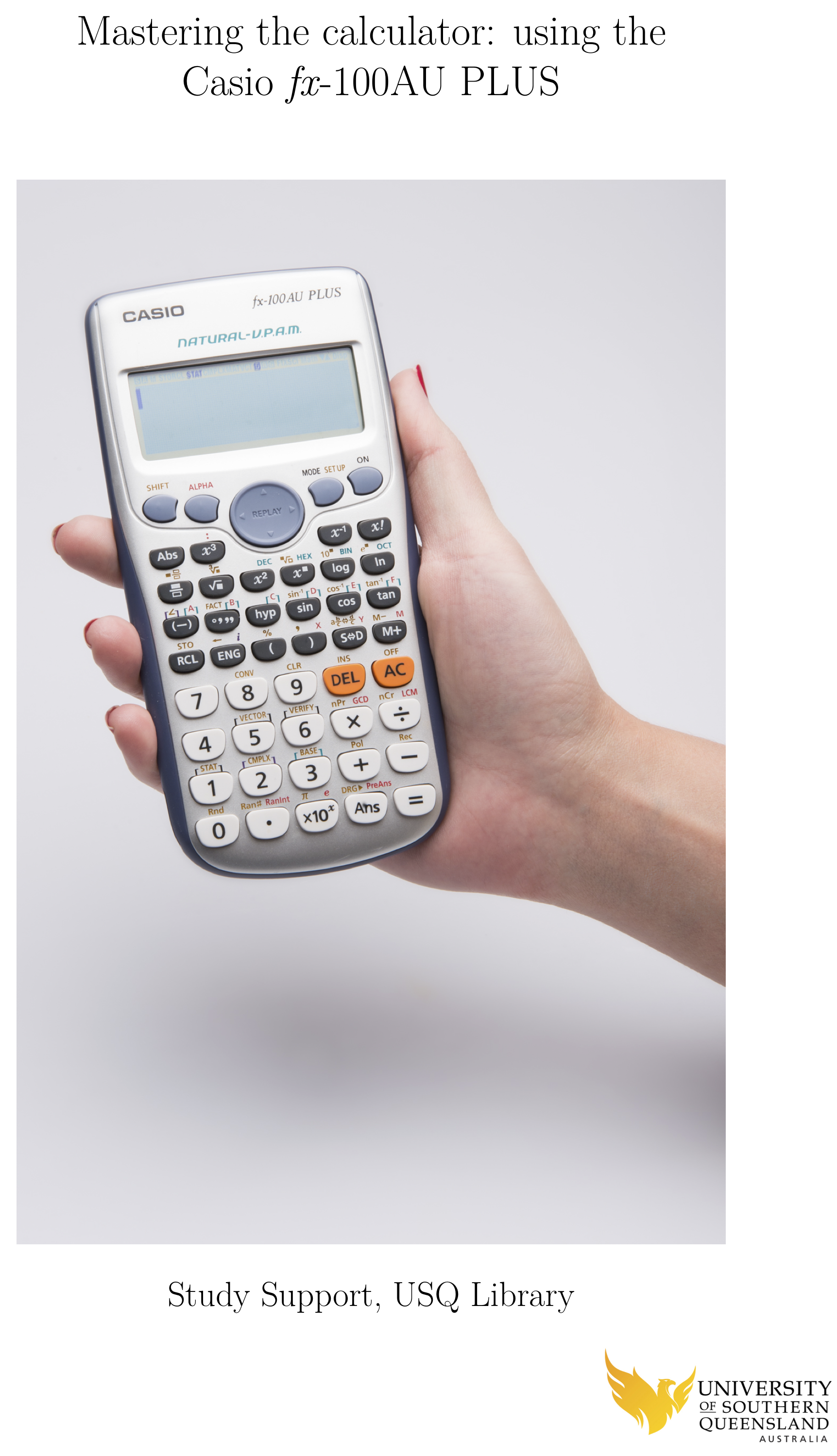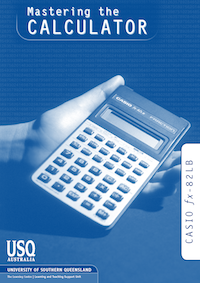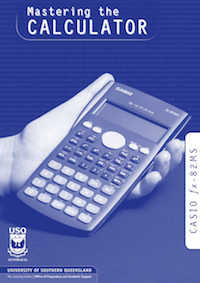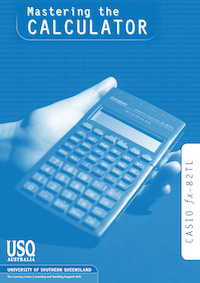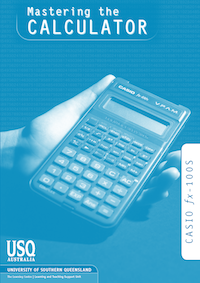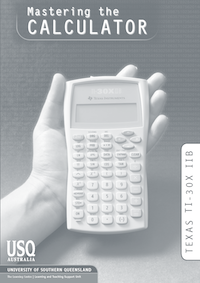Mathematics Skills
| Site: | OpenDesk |
| Course: | Study Support: Mathematics |
| Book: | Mathematics Skills |
| Printed by: | Guest user |
| Date: | Wednesday, 11 February 2026, 2:30 AM |
Description
Mathematics Skills
Table of contents
- Success in Maths at UniSQ
- Success in Maths for Aviation
- Success in Maths for Economics
- Success in Maths for Finance
- Success in Maths for (Beginning) Engineering
- Success in Maths for Nursing & Health
- Success in Maths for Paramedicine
- Success in Maths for Teaching
- Success in Maths for Science
- Success in Maths for IT
- Success in Maths for Statistics
- Maths Topics
- Mastering the calculator
- Mathematics QuickTips
Success in Maths at UniSQ
Many undergraduates courses at UniSQ have embedded within their structure mathematics at various levels. The following programs will
- assist you to identify your mathematical readiness
- develop the necessary mathematical skills
Success in Maths for Aviation
To support you in your Aviation studies, UniSQ Support for Learning provides a range of activities to assist with mathematics skills.
Quick Videos and print resources to refresh your Maths skills
Arithmetic & Mental Maths
Order of operations (print handout)
This 6 minute video covers the importance of the order of operations with examples.
There is also a QuickTip for Order of Operations with aviation examples.
Operations involving negative numbers (print handout)
This 10 minute video covers how to calculate with negative numbers.
Decimals (including percentages and rates) (print handout)
This 11 minute video covers
- the link between fractions and decimals
- converting between fractions and decimals
- percentages, including percentage increase and decrease
- rates.
There is also a QuickTip for percentages.
Other QuickTips and other print resources for Arithmetic and Mental Maths:
Graphs and graphing
Relationships as graphs (print handout)
This 8 minute video covers the Cartesian co-ordinate system and drawing graphs.
Gradient (print handout)
This 7 minute video covers how to
- find the gradient (or slope) of a straight (linear) line
- drawing a line using a point and the gradient.
Algebra
Introduction to Algebra: relationships as words (print handout)
This12 minute video covers:
- translating from words to symbols (relationships)
- variables and expressions
- collecting like terms.
Substituting and rearranging equations (print handout)
This 12 minute video covers
- substituting values into equations
- rearranging equations.
There is also a QuickTip to help you rearrange equations.
Trigonometry
Pythagoras' Theorem (print handout)
This 4 minute video covers using Pythagoras' Theorem.
Introduction to trigonometry (printable handout)
This 20 minute video introduces:
- labeling triangles for trigonometry
- Pythagoras' Theorem
- trigonometric ratios
- worked examples using trigonometric ratios
Success in Maths for Economics
Economics requires a basic knowledge of arithmetic, algebra and graphing.
Current students can use our Readiness testing in mathematics (UConnect username and password required) to self assess your knowledge and skills and should take about half an hour to complete.
Current students can access the refreshment materials to review their basic maths skills with examples and activities. There are also four videos designed to assist you with the first four modules of this material.
Anyone can access the below videos to assist with preparation for Success in Maths for Economics.
Module 1: Arithmetic
This 17-minute video includes information on
- useful keys on the calculator
- order of calculation
- percentage change
- decimals, fractions, ratios
- reading tables
Module 2: Introductory graphing
This 8-minute video includes information on
- types of graphs
- setting up graphs, plotting points
- graphing from a table of values, and areas of graphs
Module 3: Algebra
This 15-minute video includes information on
- what are variables
- what are formulae
- using substitutions and interpretation
Module 4: Further Graphing
This 14-minute video includes information on
- gradients
- special lines
- Production Productivity Frontier
You can also get help Mastering your calculator – free, easy to follow online booklets on a range of scientific calculators.
Net present Value QuickTip
Success in Maths for Finance
To support students enrolled in Finance studies, The Library provides a range of activities to assist you to develop your mathematics skills.
To assist you if you have had bad experiences at school, not enough exposure to mathematics or the exposure was a number of years ago we have developed a series of videos and quick tips.
These resources are based on the materials that is required for courses like FIN1103.
To view files, click on the topic you wish to refresh. A copy of presentation is available for you to download (Print Handout).
Videos to watch
Have you got a maths bully in your brain?
This 3-minute video shows how to overcome the maths bully you may have in your brain.
Order of operations (print handout)
This 7 minute video covers the importance of the order of operations with examples.
Fractions (print handout)
This 16-minute video covers:
- Equivalent fractions
- Mixed number and improper fractions
- Addition, subtraction, multiplication and division of fractions
Decimals (print handout)
This 11-minute video covers:
- the link between fractions and decimals
- converting between fractions and decimals
- percentages
- rates
Index Laws (print handout)
This 12-minute video introduces:
- Power (or index) notation
- Power (or index) rules
- Using power (or index) rules to simplify expressions.
Substituting and rearranging equations (print handout)
This 12-minute video covers:
- substituting values into equations
- rearranging equations
- including a range of examples
Quick Tips
You can also have a look at our general Mathematics QuickTips. Here a some of the most important quick tips for FIN1103:
Success in Maths for (Beginning) Engineering
Engineers require a sound knowledge of mathematics.
To assist you if you have had bad experiences at school, not enough exposure to mathematics or the exposure was a number of years ago we have developed a series of videos.
Please complete the online readiness test for ENM1500 to self assess if you need to work through the videos. These videos are based on the appendices in the ENM1500 materials.
If you are studying ENM1600, there is also a readiness test you can use to self assess your needs, including refreshment material.
To view files click on the topic you wish to refresh and choose the MP4 or iPad option. A copy of presentation is available for you to download (Print Handout).
Arithmetic
Calculating with negative numbers (print handout)
This 10 minute video covers how to calculate with negative numbers.
Order of operations (print handout)
This 7 minute video covers the importance of the order of operations with examples.
Fractions (print handout)
This 16 minute video covers:
- Equivalent fractions
- Mixed number and improper fractions
- Addition, subtraction, multiplication and division of fractions.
Fractions in other forms - Decimals (print handout)
This 11 minute video covers:
- the link between fractions and decimals
- converting between fractions and decimals
- percentages
- rates.
Algebra
Algebraic relationships (print handout)
This 9 minute video introduces:
- translating from words to symbols (relationships)
- variables and expressions
- collecting like terms.
Substituting and rearranging equations (print handout)
This 12 minute video covers:
- substituting values into equations
- rearranging equations
- including a range of examples.
Inequalities (print Handout)
This 12 minute video covers graphing inequalities and rearranging inequalities.
Index laws (print handout)
This 17 minute video introduces:
- Power (or index) notation
- Power (or index) rules
- using power (or index) rules to simply expressions.
Graphing and Geometry
Geometry (print handout)
This 8 minute video covers common shapes and their characteristics.
Pythagoras' Theorem (print handout)
This 4 minute video covers using Pythagoras’ Theorem.
Relationships as graphs (print handout)
This 8 minute video covers the Cartesian co-ordinate system and drawing graphs.
Gradient (print handout)
This 7 minute video covers how to:
- find the gradient (or slope) of a straight (linear) line
- drawing a line using a point and the gradient.
The linear equation (print handout)
This 7 minute video covers:
- the linear equation
- finding the gradient and \(y\)-intercept
- the slope-point equation
- equations to special lines (e.g. horizontal and vertical lines).
Exponential graphs (print handout)
This 3 minute video introduces the exponential equation for growth and decay along with the corresponding graphs.
You can also get help Mastering your calculator – free, easy to follow online booklets on a range of scientific calculators.
Success in Maths for Nursing & Health
To support students enrolled in nursing studies, UniSQ provides a range of activities to assist with mathematics skills.
Current students can use our Readiness testing in mathematics (UConnect username and password required) to self assess your knowledge and skills and should take about half an hour to complete.
Current students can access the refreshment materials provide a review of basic maths skills with examples and activities.
Quick Videos to refresh your Maths skills
Arithmetic
Calculating with negative numbers (print handout)
This 10 minute video covers how to calculate with negative numbers.
Order of operations (print handout)
This 7 minute video covers the importance of the order of operations with examples.
Fractions (print handout)
This 16 minute video covers:
- Equivalent fractions
- Mixed number and improper fractions
- Addition, subtraction, multiplication and division of fractions.
Fractions in other forms - Decimals (print handout)
This 11 minute video covers:
- the link between fractions and decimals
- converting between fractions and decimals
- percentages
- rates.
Metric conversions for weight (print handout)
This 6 minute video covers how to use use metric conversions for weight, specifically for health students.
Single Digit Long Division (print handout)
This 4 minute video covers shows full working for doing long division by hand.
Algebra
Algebraic relationships (print handout)
This 9 minute video introduces:
- translating from words to symbols (relationships)
- variables and expressions
- collecting like terms
Health QuickTips
You can also have a look at our general Mathematics QuickTips. There are also some Health specific QuickTips also:
- Medication calculations - Overview
- IV calculations
- Unit conversions for Health students
- Medication calculations
- Rounding numbers
- Order of operations
- Percentages (increasing and decreasing)
- Graphs
You can also get help Mastering your calculator – free, easy to follow online booklets on a range of scientific calculators.
Success in Maths for Paramedicine
To support students enrolled in paramedicine studies, The Library provides a range of activities to assist with mathematics skills.
Quick Videos to refresh your Maths skills
Arithmetic
Calculating with negative numbers (print handout)
This 10 minute video covers how to calculate with negative numbers.
Order of operations (print handout)
This 7 minute video covers the importance of the order of operations with examples.
Fractions (print handout)
This 16 minute video covers:
- Equivalent fractions
- Mixed numbers and improper fractions
- Addition, subtraction, multiplication and division of fractions
Single Digit Long Division (print handout)
This 4 minute video shows full working for doing long division by hand.
Fraction in other forms (print handout)
This 11 minute video covers:
- the link between fractions and decimals
- converting between fractions and decimals
- percentages
- rates.
Metric conversions for weight (print handout)
This 6 minute video covers how to use use metric conversions for weight, specifically for health students.
Algebra
Algebraic relationships (print handout)
This 9 minute video introduces:
- translating from words to symbols (relationships)
- variables and expressions
- collecting like terms
Health QuickTips
You can also have a look at our general Mathematics QuickTips. There are also some Health specific QuickTips also:
- Medical calculations
- IV calculations
- Unit conversions for Health students
- Medical calculations - by weight
- Rounding numbers
- Order of operations
- Percentages (increasing and decreasing)
- Scientific notation
- Graphs
- Mathematical Communication
- Technical Communication - Tables and Figures
- Using Microsoft Word to type Mathematics
You can also get help Mastering your calculator – free, easy to follow online booklets on a range of scientific calculators.
Success in Maths for Teaching
Educators require a basic knowledge of numbers, algebra, measurement, chance & data and space.
Current students can access the readiness test (UConnect username and password required) which is a self-test that will help you decide the level of support you may need in these areas. It should take about half an hour to complete.
Current students can also access refreshment materials which provide a review of basic mathematical skills with examples and activities.
There are also a number of videos designed to assist you with this refreshment material.
Calculating with negative numbers (printable handout)
This 10 minute video covers how to calculate with negative numbers.
Order of Operations (printable handout)
This 7 minute video covers the importance of the order of operations with examples.
Fractions (print handout)
This 16 minute video covers:
- Equivalent fractions
- Mixed numbers and improper fractions
- Addition, subtraction, multiplication and division.
Fractions in other forms - Decimals (printable handout)
This 11 minute video covers:
- the link between fractions and decimals
- converting between fractions and decimals
- percentages
- rates.
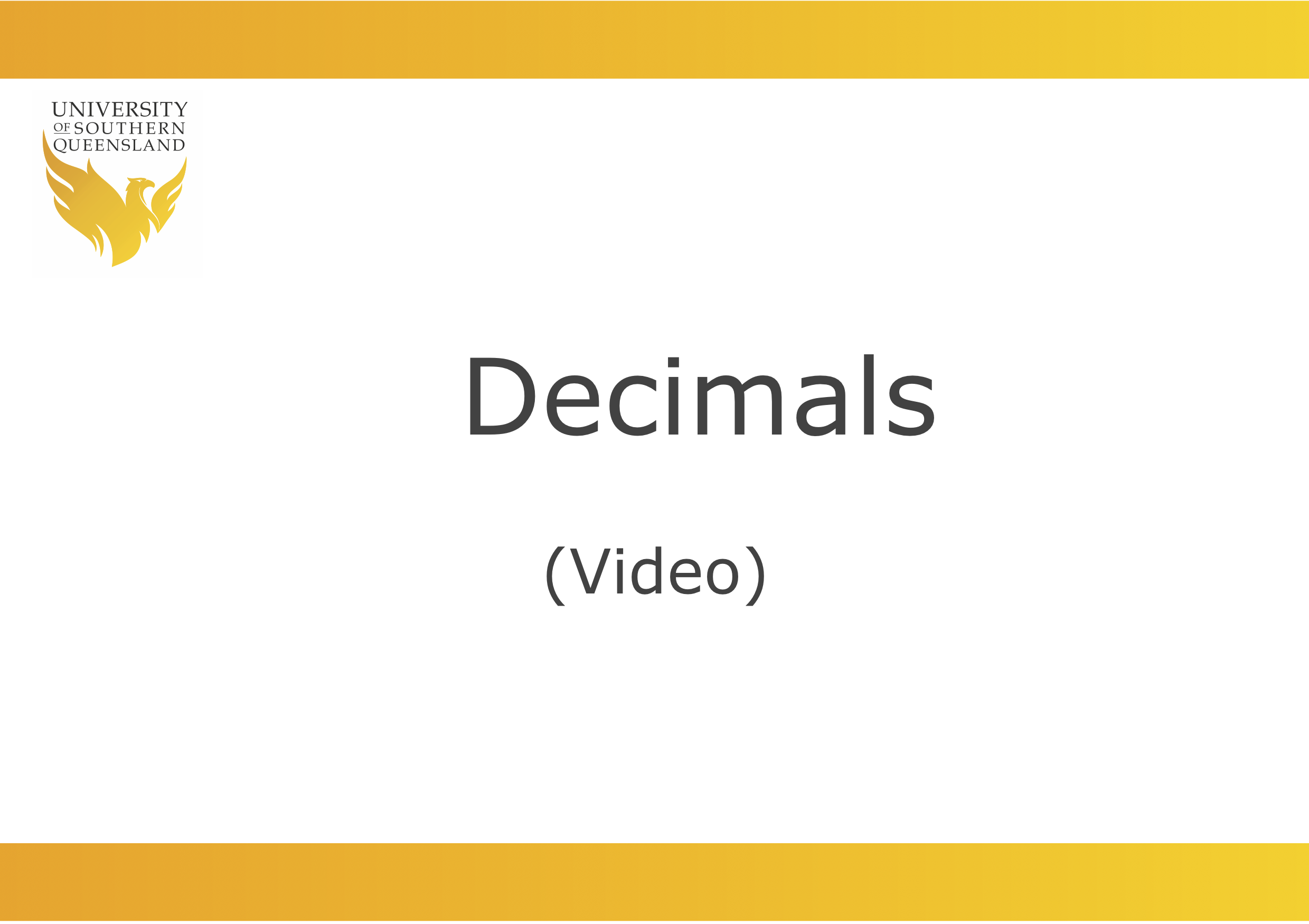
Index Laws (printable handout)
This 12 minute video introduces:
- Power (or index) notation
- Power (or index) rules
- using power (or index) rules to simply expressions.
Introduction to algebra: Relationships as words (printable handout)
This 9 minute video introduces:
- translating from words to symbols (relationships)
- variables and expressions
- collecting like terms.
Relationships as graphs (printable handout)
This 8 minute video covers the Cartesian co-ordinate system and drawing graphs.
Substituting and rearranging equations (printable handout)
This 12 minute video covers:
- substituting values into equations
- rearranging equations
- including a range of examples.
Using Pythagoras' Theorem (printable handout)
This 4 minute video covers using Pythagoras’ Theorem.
Simultaneous Equation: Substituting method (printable handout)
This 15 minute video will cover the use of the substitution method to solve a system of two equations with two unknown variables.
Gradients (printable handout)
This 7 minute video covers how to:
- find the gradient (or slope) of a straight (linear) line
- drawing a line using a point and the gradient.
The Linear Equation (printable handout)
This 7 minute video covers:
- the linear equation
- finding the gradient and \( y \)-intercept
- the slope-point equation
- equations to special lines (e.g. horizontal and vertical lines).
You can also get help Mastering your calculator – free, easy to follow online booklets on
a range of scientific calculators.
Success in Maths for Science
Students studying science require a sound knowledge of mathematics.
To assist you if you have had bad experiences at school, not enough exposure to mathematics or the exposure was a number of years ago we have developed a series of videos.
These videos are based on the materials that is assumed in MAT1100.
To view files click on the topic you wish to refresh. A copy of presentation is available for you to download (Print Handout).
Arithmetic
Calculating with negative numbers (print handout)
This 10 minute video covers how to calculate with negative numbers.
Order of operations (print handout)
This 6 minute video covers the importance of the order of operations with examples
Fractions (print handout)
This 16 minute video covers:
- Equivalent fractions
- Mixed number and improper fractions
- Addition, subtraction, multiplication and division of fractions.
Fractions in other forms - Decimals (print handout)
This 11 minute video covers:
- the link between fractions and decimals
- converting between fractions and decimals
- percentages
- rates.
Algebra
Algebraic relationships (print handout)
This 9 minute video introduces:
- translating from words to symbols (relationships)
- variables and expressions
- collecting like terms.
Rearranging equations (print handout)
This 12 minute video covers:
- substituting values into equations
- rearranging equations
- including a range of examples.
Inequalities (print Handout)
This 12 minute video covers graphing inequalities and rearranging inequalities.
Index laws (print handout)
This 17 minute video introduces:
- Power (or index) notation
- Power (or index) rules
- using power (or index) rules to simply expressions.
Graphing and Geometry
Geometry (print handout)
This 7 minute video covers common shapes and their characteristics.
Pythagoras' Theorem (print handout)
This 4 minute video covers using Pythagoras’ Theorem.
Relationships as graphs (print handout)
This 7 minute video covers the Cartesian co-ordinate system and drawing graphs.
Gradient (print handout)
This 7 minute video covers how to:
- find the gradient (or slope) of a straight (linear) line
- drawing a line using a point and the gradient.
The linear equation (print handout)
This 7 minute video covers:
- the linear equation
- finding the gradient and \(y\)-intercept
- the slope-point equation
- equations to special lines (e.g. horizontal and vertical lines).
Exponential graphs (print handout)
This 3 minute video introduces the exponential equation for growth and decay along with the corresponding graphs.
You can also get help Mastering your calculator – free, easy to follow online booklets on a range of scientific calculators.
Success in Maths for IT
Students studying IT require a sound knowledge of mathematics.
To assist you if you have had bad experiences at school, not enough exposure to mathematics or the exposure was a number of years ago we have developed a series of videos.
These videos are based on the materials that is assumed in MAT1101 (found in the appendix of your study material (USQ username and password required)).
To view files click on the topic you wish to refresh. A copy of presentation is available for you to download (Printable Handout).
Index Laws (printable handout)
This 17 minute video introduces:
- Power (or index) notation
- Power (or index) rules
- Using power (or index) rules to simplify expressions.
Expanding Brackets (printable handout)
This 19 minute video covers:
- Distributive Law
- Expanding brackets (single, double and triple)
- Common expansions to get to know
Factorising quadratic expressions (printable handout)
This 13 minute video covers:
- Simple factorisation (adding one set of brackets)
- Factorising quadratic expressions
Solving quadratic equations using factorisation (printable handout)
This 7 minute video covers:
- Quadratic equations
- solving quadratic equations using factorisation
Solving quadratic equations using the quadratic formula (printable handout)
This 12 minute video covers:
- Quadratic equations
- The quadratic equation
- Using the quadratic equation
- finding the number of solutions a quadratic equations will have.
Solving simultaneous equations (using the substitution method) (printable handout)
This 15 minute video covers the use of the substitution method to solve simultaneous equations (two unknown variables and two equations).
Solving simultaneous equations (using the elimination method) (printable handout)
This 16 minute video covers the use of the elimination method to solve simultaneous equations (two unknown variables and two equations).
Fractions (printable handout)
This 16 minute video covers
- Equivalent fractions
- Mixed number and improper fractions
- Addition, subtraction, multiplication and division of fractions.
Algebraic fractions (printable handout)
This 11 minute video steps though cancelling when there is algebraic terms in both the numerator and the denominator.
Success in Maths for Statistics
Statistics require a basic knowledge of arithmetic, algebra and graphing.
Current students can complete an online readiness testing in mathematics (UConnect username and password required) to self assess knowledge and help to decide the level of support required in these areas. It should take about half an hour to complete.
The refreshment materials provide a review of basic math's skills with full worked examples and activities (with answers).
Success in Maths for Statistics online workshops include topics of formulas, arithmetic, calculator, graphing and basic statistics.
Module 1: Arithmetic
This 16 minute video includes information on:
- useful keys on the calculator
- order of operations
- calculating percentages.
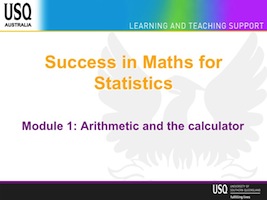
Module 2: Algebra
This 19 minute video includes:
- use of mathematical formulae
- rearranging and solving equations
- develop and solve equations relating to practical situations.
Module 3: Graphing
This 19 minute video includes:
- representing relationships as graphs
- drawing graphs
- the linear function
- applications of graphs in statistics
- demonstration with the SPSS package.
You can also get help Mastering your calculator – free, easy to follow online booklets on a range of scientific calculators.
Maths Topics
Mathematics is often a part of university study, so it is important to develop the mathematical skills necessary for study within most disciplines. Resources are available for students who have maths anxiety or for students who are studying mathematics off-campus. Assistance is also available with using calculators.
Current students can access online readiness testing and refreshment materials to prepare for the maths required in their programs. There are also a range of video snippets which compliment these materials for courses such as nursing, economics, statistics and engineering.
A range of downloadable print materials for a range of maths topics are available to assist you to improve your prerequisite mathematics skills, as well as additional online maths and sciences resources. Activities and fully worked solutions are included for topics from arithmetic through to introductory calculus.
Arithmetic
Print based materials
Print Materials to assist with any pre-requisite mathematics required in USQ courses. These materials are based on USQ's Tertiary Preparation Program. Mathematics modules are presented in increasing level of difficulty and complexity from Level A through to Level D.
More than just numbers (Level A)
- Our number system (including whole numbers, place value & estimation)
- Working with numbers (including power notation and the square root)
- Calculations involving negative numbers
- Order of calculations
- Fractions (including equivalent fractions, mixed numbers and improper fractions, calculating with fractions, addition and subtraction of fractions, multiplication of fractions and division of fractions)
- Decimals (including converting between decimals and fractions)
The Power of Numbers (Level A)
- Power notation
- Calculating with powers including multiplying powers, dividing powers, negative indices, the zero index, adding and subtracting powers, special powers, fractional indices, finding a power of a power and finding a power of a product)
- Common applications of powers (including scientific notation, the metric system, converting between units)
Video based materials
You can also watch some video snippets for some of arithmetic concepts
Calculating with negative numbers (print handout)
This 10 minute video covers how to calculate with negative numbers.
Order of operations (print handout)
This 6 minute video covers the importance of the order of operations with examples
Fractions (print handout)
This 16 minute video covers:
- Equivalent fractions
- Mixed number and improper fractions
- Addition, subtraction, multiplication and division.
Decimals: Fractions in other forms (print handout)
This 11 minute video covers:
- the link between fractions and decimals
- converting between fractions and decimals
- percentages, including percentage increase and decrease
- rates.
You can also get help Mastering your calculator – free, easy to follow online booklets on a range of scientific calculators.
Algebra, functions and graphing
Print based materials
Print Materials to assist with any pre-requisite mathematics required in USQ courses. These materials are based on USQ's Tertiary Preparation Program. Mathematics modules are presented in increasing level of difficulty and complexity from Level A through to Level D.
Representing relationships (Level A)
- Writing relationships in words
- Writing relationships as formulas
- Representing relationships as graphs
- Describing relationships
Generalising numbers - Algebra (Level A)
- Simplifying expressions
- Rearranging equations
- Solving equations Equations involving powers and roots including Pythagoras' Theorem
- Simultaneous equations
Generalising numbers - Graphs (Level A)
- Gradients of line graphs (including finding the gradient of a given line, and drawing a line given the gradient)
- Linear equations (including special lines, and what if two lines cross) Introduction to curve
- Parabolic equations (including the axis of symmetry)
- Exponential equations (including a special number)
- When two graphs meet
Algebra: Tools for change (Level B)
- Describing relationships
- Manipulating relationships (including grouping like terms, factors and factorization, algebraic fractions and working with powers)
- Special relationships (including equations, solving equations, rearranging formulas, inequations, absolute value, quadratic equations, factorisation of quadratic equations, the quadratic formula, quadratic equations in the real world, solving simultaneous equations using substitution and elimination)
Relations and functions (Level B)
- What are relations and functions (including domain and range of relations and functions and function notation)
- The linear function (including rate of change of a linear function, the inverse – undoing a function and when two linear functions meet)
- The quadratic function (including sketching parabolas and rate of change of a quadratic function)
- Other functions
Relations and functions (Level C)
- What are functions Function toolbox (including functional notation, zero conditions of a function, average rate of change of a function, continuity and the inverse of a function)
- Families of functions (including polynomial functions (which include the constant function, the linear function, the quadratic function, and other polynomial functions), exponential and logarithmic functions, rational functions and functions over an integral domain (including arithmetic and geometric sequences)
Algebra, functions and geometry (Level D)
- Inequalities and the real number line (including operations on inequalities, and linear inequalities of two variables)
- Quadratic Equations and Completing the Square
- Functions (including polynomials, rational functions, other important non-linear functions, solving simultaneous equations algebraically and graphically inverse functions and continuity)
Videos for Algebra
You can also watch some video snippets for some of algebra concepts.
Introduction to Algebra: relationships as words (print handout)
This 12 minute video covers
- translating from words to symbols (relationships)
- variables and expressions
- collecting like terms.
Substituting and rearranging equations (print handout)
This 12 minute video covers
- substituting values into equations
- rearranging equations.
Expanding Brackets (print handout)
This 19 minute video covers
- the distributive law
- expanding brackets (single, double and triple)
- common expressions to get to know.
Algebra: factorising quadratic expressions (print handout)
This 13 minute video covers
- simple factorisations (adding one set of brackets)
- factorings quadratic expressions (two brackets).
Solving quadratic equations using factorisation (print handout)
This 7 minute video covers
- quadratic equations
- solving quadratic equations using factorisation.
Solving quadratic equations using the quadratic formula (print handout)
This12 minute video covers
- quadratic equations
- the quadratic equation
- using the quadratic equation
- finding the number of solutions a quadratic equation will have.
Solving simultaneous equations (using the substitution method) (print handout)
This 15 minute video covers the use of substitution method to solve simultaneous equations (two unknown variables and two equations).
Solving simultaneous equations (using the elimination method) (print handout)
This 16 minute video covers the use of the elimination method to solve simultaneous equations (two unknown variables and two equations).
Inequalities (print handout)
This 12 minute video covers graphing inequalities and rearranging inequalities.
Cancelling with algebraic fractions (print handout)
This 5 minute video steps though cancelling when there is algebraic terms in both the numerator and the denominator.
Videos for Graphing
Geometry (print handout)
This 7 minute video covers common shapes and their characteristics.
Pythagoras' Theorem (print handout)
This 4 minute video covers using Pythagoras' Theorem.
Relationships as graphs (print handout)
This 8 minute video covers the Cartesian co-ordinate system and drawing graphs.
Gradient (print handout)
This 7 minute video covers how to
- find the gradient (or slope) of a straight (linear) line
- drawing a line using a point and the gradient.
The linear equation (print handout)
This 7 minute video covers
- the linear equation
- finding the gradient and \(y\)-intercept
- the slope-point equation
- equations to special lines (e.g. horizontal and vertical lines).
Exponential graphs (print handout)
This 3 minute video introduces the exponential equation for growth and decay along with with the corresponding graphs.
Other videos which might be useful
Solving Equations:
The purpose of these videos is to use flow-charts and a process called back tracking to solve equations. These videos build on each other.
Rearranging Formulas:
These presentations demonstrate how rearranging algebraic formula can be achieved using a flow-chart approach.
Simplifying Indices:
This video shows has worked examples of how to use the index laws to simply expressions.
Algebraic fractions:
This video steps though cancelling when there is algebraic terms in both the numerator and the denominator.
You can also get help Mastering your calculator – free, easy to follow online booklets on a range of scientific calculators.
Exponentials and logarithms
Print based materials
Print Materials to assist with any pre-requisite mathematics required in USQ courses. These materials are based on USQ's Tertiary Preparation Program. Mathematics modules are presented in increasing level of difficulty and complexity from Level A through to Level D.
Generalising Numbers (part of module)
- Gradients of line graphs (including finding the gradient of a given line, and drawing a line given the gradient)
- Linear equations (including special lines, and what if two lines cross)
- Introduction to curve
- Parabolic equations (including the axis of symmetry)
- Exponential equations (including a special number)
- When two graphs meet
Exponential and logarithmic functions
- Exponential functions (including the function and its graph, case studies, average rate of change and the inverse of the exponential function)
- Logarithmic functions (including the function and its graph, case studies, average rate of change and properties of logarithms)
- Putting it all together – solving equations and real world applications
Relations and functions (part of module)
- What are functions
- Function toolbox (including functional notation, zero conditions of a function, average rate of change of a function, continuity and the inverse of a function)
- Families of functions (including polynomial functions (which include the constant function, the linear function, the quadratic function, and other polynomial functions), exponential and logarithmic functions, rational functions and functions over an integral domain (including arithmetic and geometric sequences)
Algebra, functions and geometry
- Inequalities and the real number line (including operations on inequalities, and linear inequalities of two variables)
- Quadratic Equations and Completing the Square
- Functions (including polynomials, rational functions, other important non-linear functions, solving simultaneous equations algebraically and graphically inverse Functions and continuity)
Videos:
Index Laws (print handout)
This 17 minute video introduces:
- Power (or Index) laws
- Power (or index) rules
- Using power (or index rules to simplify expressions.
An introduction to logarithms (printable handout)
This 12 minute video shows an introduction to logarithms. It has examples of using different bases and applying the different logarithms laws.
Solving equations using logarithms (printable handout)
This 7 minute video works through some examples of using logarithms to solve equations.
You can also get help Mastering your calculator – free, easy to follow online booklets on a range of scientific calculators.
Trigonometry
Print based materials
Print Materials to assist with any pre-requisite mathematics required in USQ courses. These materials are based on USQ's Tertiary Preparation Program. Mathematics modules are presented in increasing level of difficulty and complexity from Level A through to Level D.
Comparing numbers (part of module only)
- Comparing quantities of subtraction
- Comparing quantities by division (including percentages)
- Ratios (including ratios in squares, rectangles, circles & triangles)
- Rates
Trigonometry (Level B)
- Sine (including the sine ratio, the sine function, the inverse of the sine function, degrees, minutes and seconds, amplitude and period)
- Cosine (including the cosine ratio, the cosine function, the inverse of the cosine function, amplitude and period)
- Tangent (including the tangent ratio, the tangent function, the inverse of the tangent function, amplitude and period)
Trigonometric functions (Level C)
- Radian measure (including what are radians, converting from degrees to radians, converting from radians to degrees, using radians measure in real world applications)
- Graphs of sine, cosine, and tangent functions
- Modelling using trigonometric functions (including amplitude, vertical shift, the period of trigonometric functions, the phase of trigonometric functions)
- Inverse functions
- Solving trigonometric equations
Video based materials
Introduction to trigonometry (printable handout)
This 20 minute video introduces:
- labeling triangles for trigonometry
- Pythagoras' Theorem
- trigonometric ratios
- worked examples using trigonometric ratios
Solution to triangles - using the Sine and Cosine Rules
This 18 minute video shows how to use the sine and cosine rules (that is, when you do not have right angled triangles.
You can also get help Mastering your calculator – free, easy to follow online booklets on a range of scientific calculators.
Matrices, vectors and discrete maths
Print Materials to assist with any pre-requisite mathematics required in USQ courses. These materials are based on USQ's Tertiary Preparation Program. Mathematics modules are presented in increasing level of difficulty and complexity from Level A through to Level D.
Matrices (Level B)
- What are matrices (including: tables to matrices, defining a matrix, and matrix equality)
- Calculating with matrices (including: addition, subtraction and multiplication)
- Some special matrices (including: the identity matrix and the inverse matrix)
- Solving matrix equations
- Real world problems
Analytical geometry (Level C)
- Describing points in space (including: rectangular coordinates, polar coordinates, and vectors)
- Describing straight lines (including: equations of a straight line, distance between points and mid-point of a line)
- Describing other curves (including circles)
- Transformations (including: transforming points, straight lines, parabolas, circles and other curves)
Matrices (Level D)
- Matrix representation of data
- Addition and subtraction of matrices
- Multiplication of a matrix by a scalar
- Multiplication of a matrix by a vector
- Multiplication of two matrices
- Special matrices
- Linear equations in matrix form
- Solution of a system of linear equations by row reduction
- Solution of linear equations using the inverse of the coefficient matrix
- Inverse matrices
- Determinant of a square matrix
You can also get help Mastering your calculator – free, easy to follow online booklets on a range of scientific calculators.
Calculus
Print based materials
Print Materials to assist with any pre-requisite mathematics required in USQ courses. These materials are based on USQ's Tertiary Preparation Program. Mathematics modules are presented in increasing level of difficulty and complexity from Level A through to Level D.
Differentiation – looking at change (Level C)
- Rate of change – the problem of the curve
- Instantaneous rate of change and the derivative function
- Shortcuts for differentiation (including: polynomial and other power functions, exponential functions, logarithmic functions, trigonometric functions, and where the derivative cannot be found)
- Some applications of differential calculus (including: displacement-velocity-acceleration: when derivatives are meaningful in their own right, twists and turns, and optimization)
Integration – looking at change (Level C)
- Area under the curve
- The definite integral
- The antiderivative
- Steps in integration (including: using standard rules of integration, integrals of functions with constant multiples, and integrals of sum and difference functions)
- More areas
- Applications of integral calculus
Differentiation
- Derivatives
- Gradient functions
- Differentiability
- Derivatives of simple functions
- Practical interpretations of the derivative
- Simple applications of the derivative
- The product rule
- The quotient rule
- The chain rule
- Stationary points
- Curve sketching
- Maximum / minimum problems
- Newton-Raphson method for finding roots
- Solutions to exercise sets
Videos:
Chain and Product rules:
This video shows worked examples for how to use the chain and product rules for differentiating functions.
You can also get help Mastering your calculator – free, easy to follow online booklets on a range of scientific calculators.
Statistics
Print Materials to assist with any pre-requisite mathematics required in USQ courses. These materials are based on USQ's Tertiary Preparation Program. Mathematics modules are presented in increasing level of difficulty and complexity from Level A through to Level D.
Dealing with data (Level A)
- Collecting data
- Organising and displaying data from tables
- Organising and displaying raw data (including: frequency distribution tables and grouped frequency distribution tables, frequency histograms, and stem-and-leaf plots)
- Analysing data (including: measuring the centre and spread of data)
- Data with two variables.
Statistics and probability (Level B)
- Collecting data (including: how data are displayed and exploring single variable data sets)
- Take your chances – probability (including: experimental probabilities, theoretical probabilities, and probability in practice)
- Describing single data sets (including: the centre and spread of a data set)
- Describing bivariate data sets
You can also get assistance with Statistics by having a look at the Success in Maths for Statistics program.
You can also get help Mastering your calculator – free, easy to follow online booklets on a range of scientific calculators.
Mastering the calculator
A series of booklets for Sharp and Casio calculators are available to assist USQ students to learn how to use their calculator effectively.
The instructions in these booklets explain how to perform basic calculations.
Sharp
Mathematics QuickTips
QuickTips:
QuickTips are short pdf documents which can be used to support your learning.
- Studying Mathematics
- Rounding Numbers
- Significant figures
- Order of Operations
- Percentages
- Scientific notation
- Units
- Rearranging linear equations
- Graphs
- Mathematical Communication
- Technical Communication - Tables and Figures
- Using Microsoft Word to type Mathematics
- Calculus - Introduction to limits
- Calculus - Limits approaching from each side
- Calculus - Differentiation Rules
- Calculus - Integration Rules
